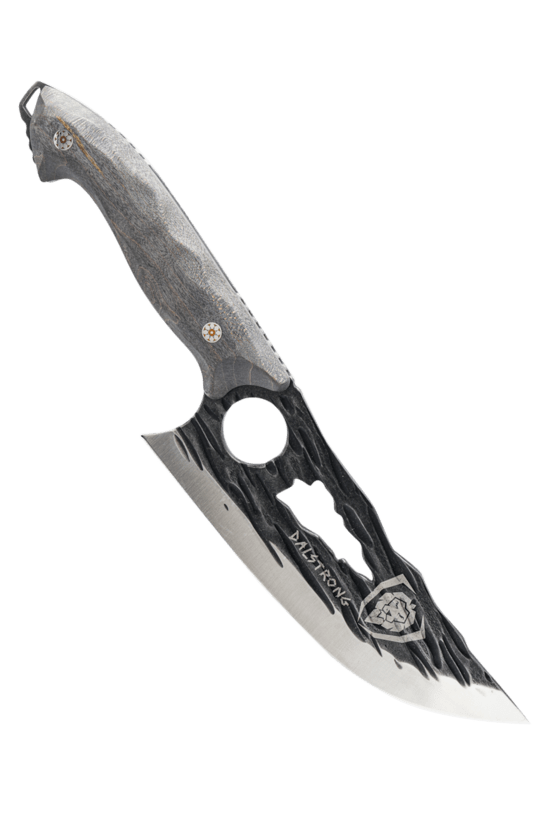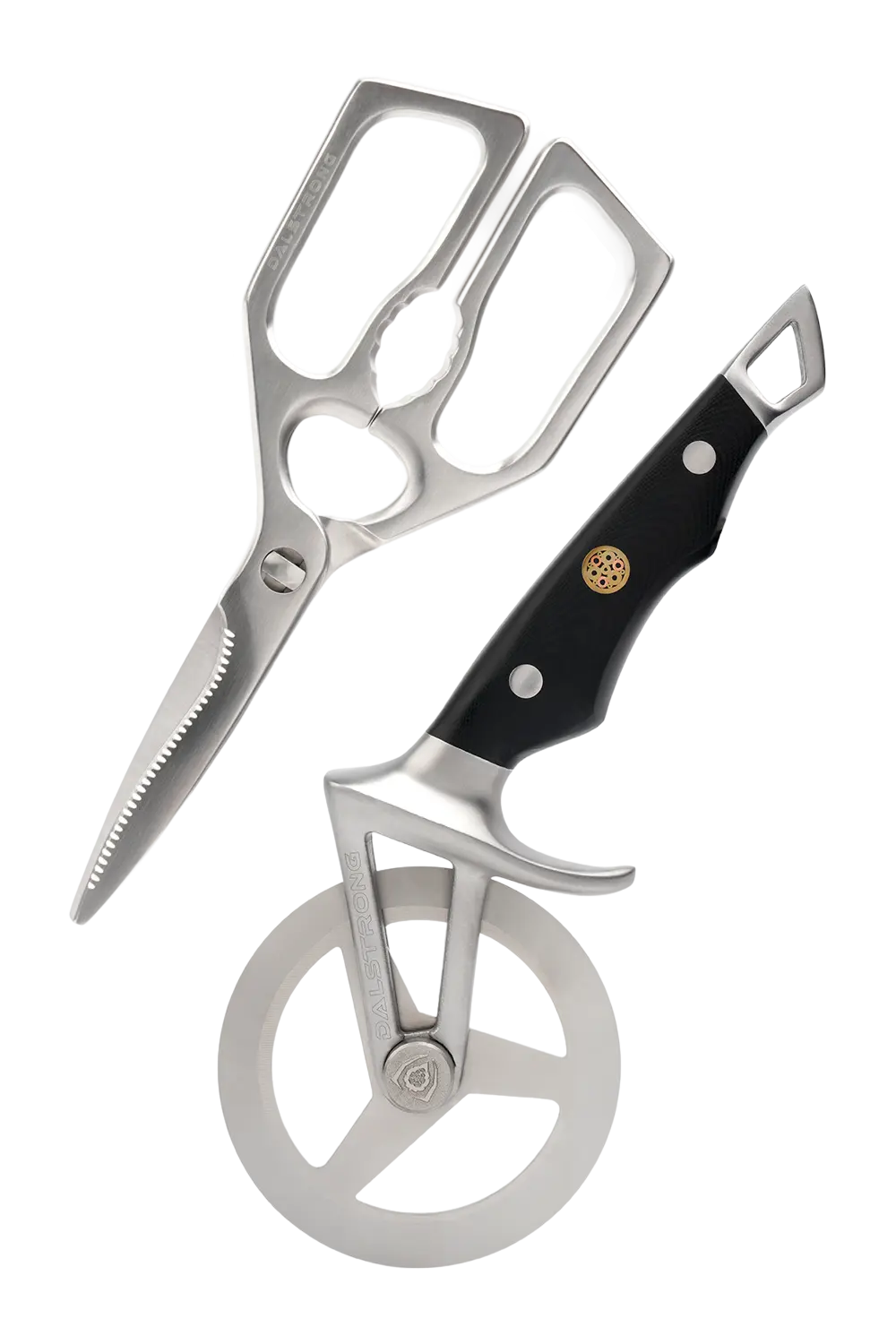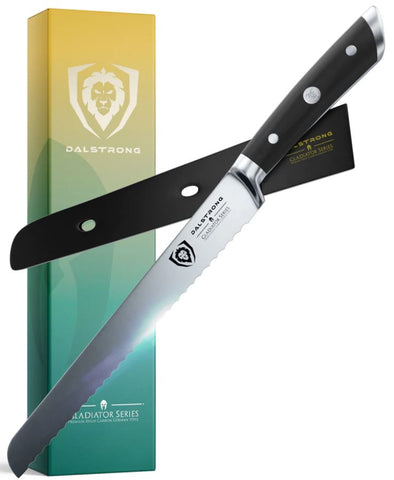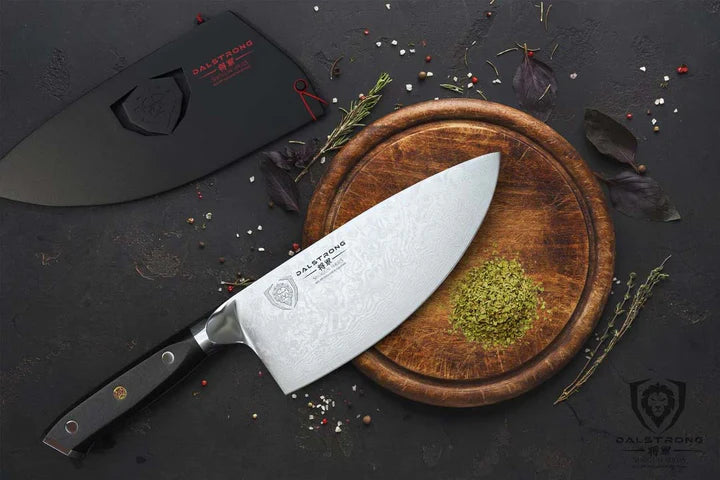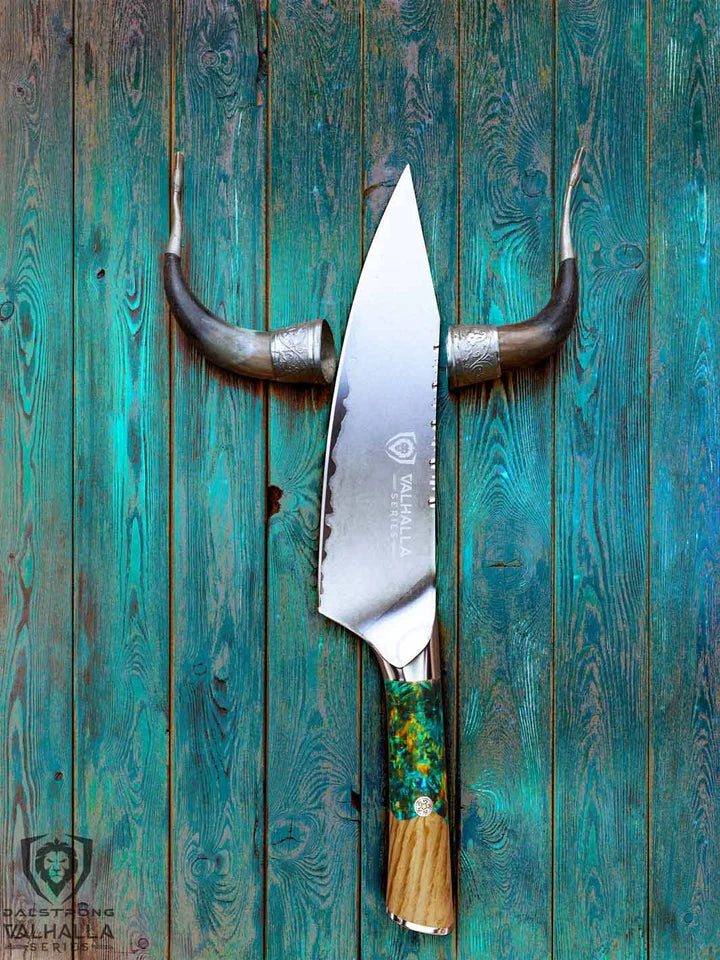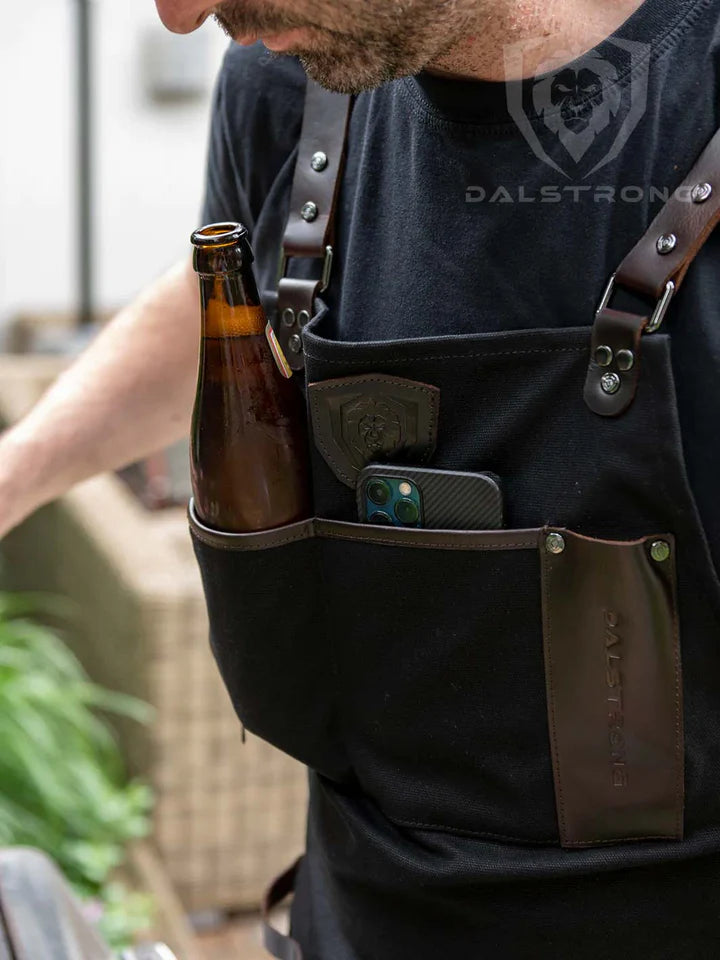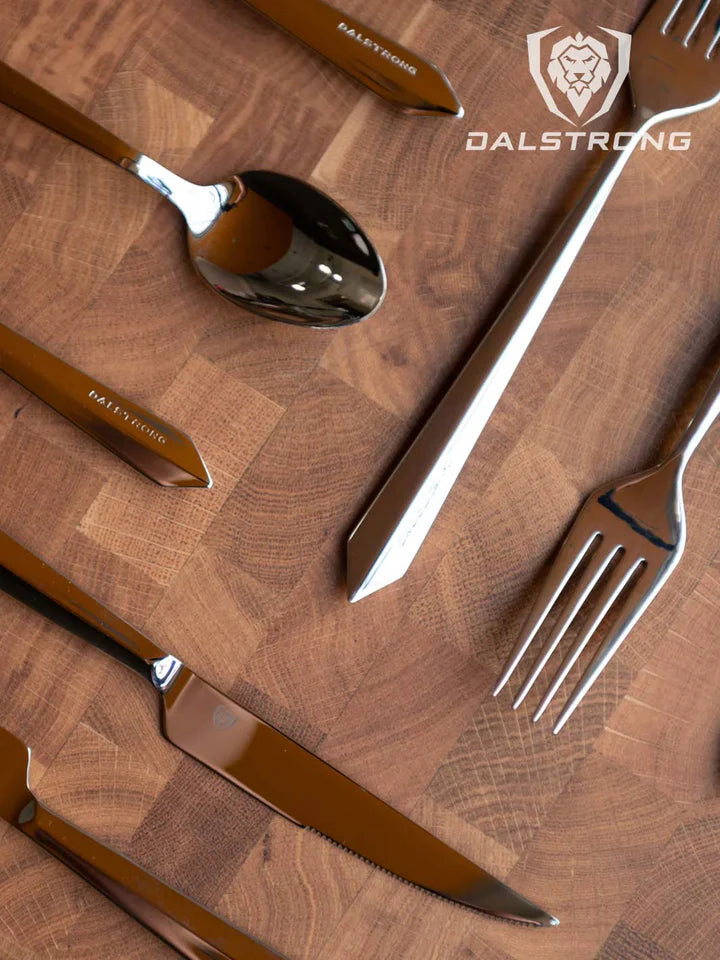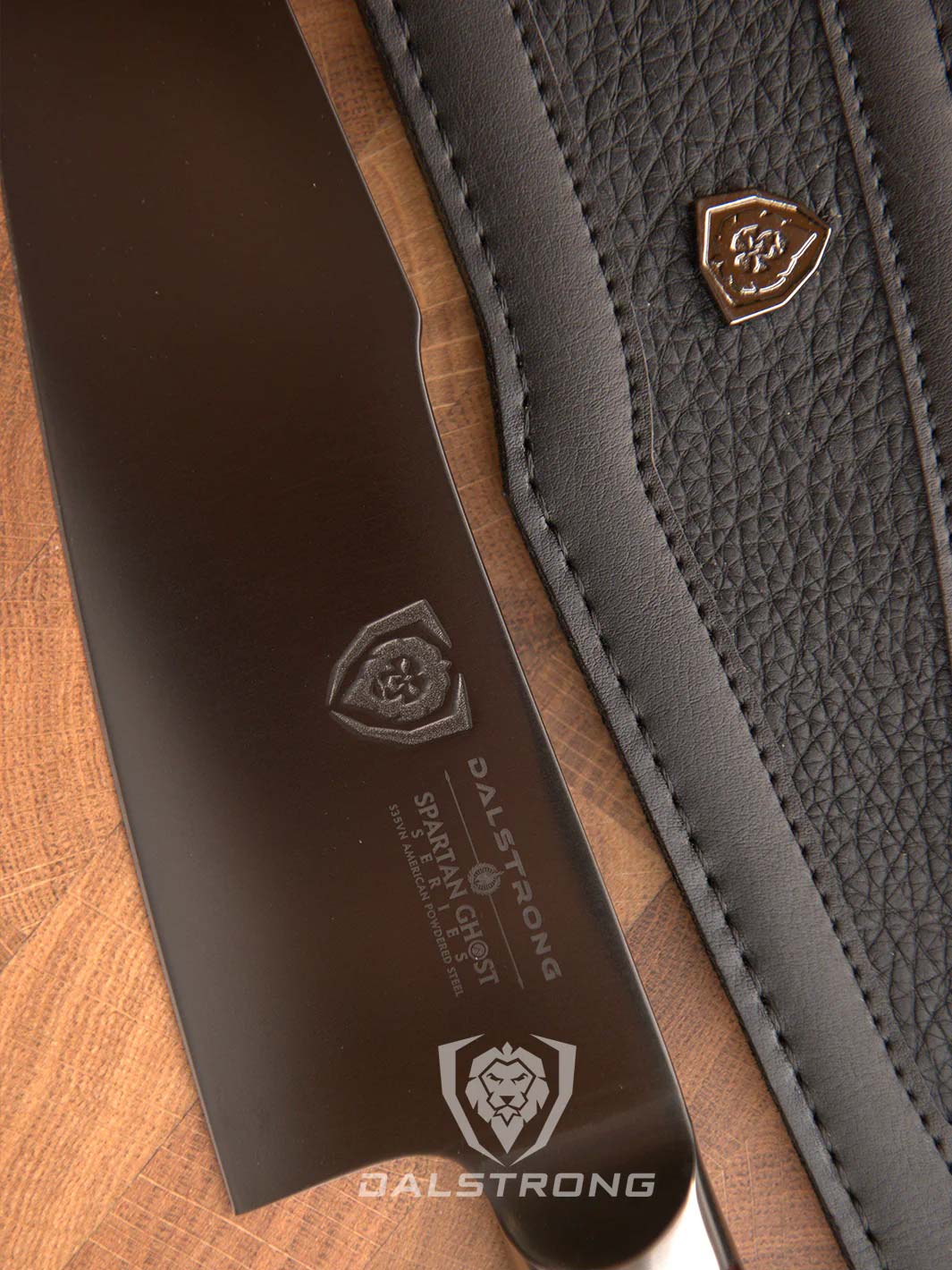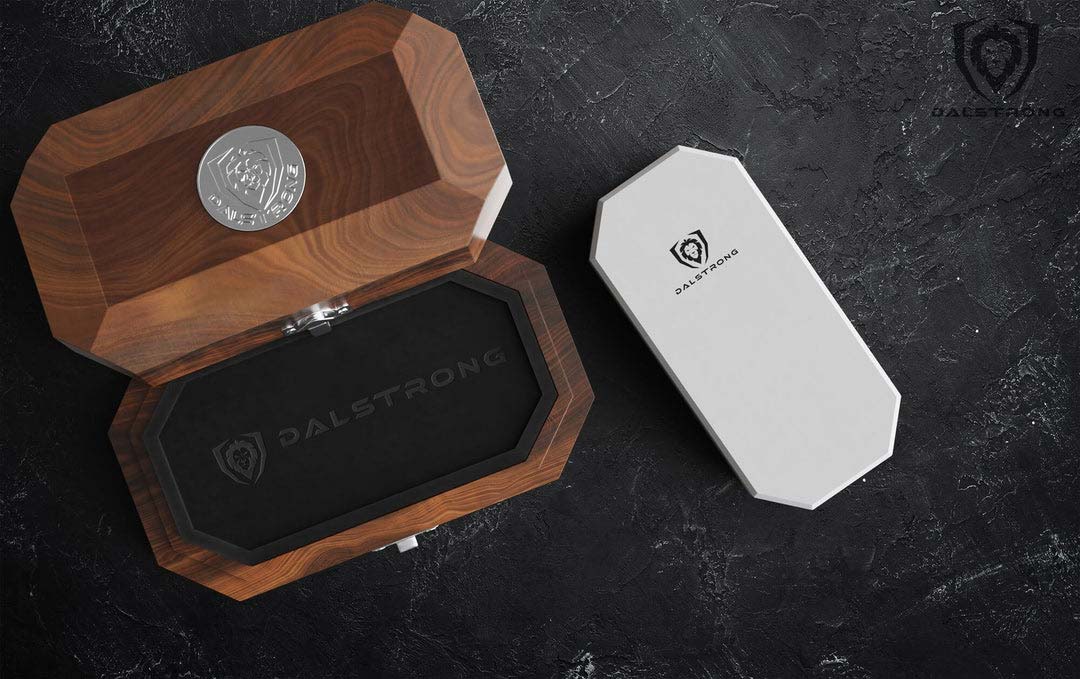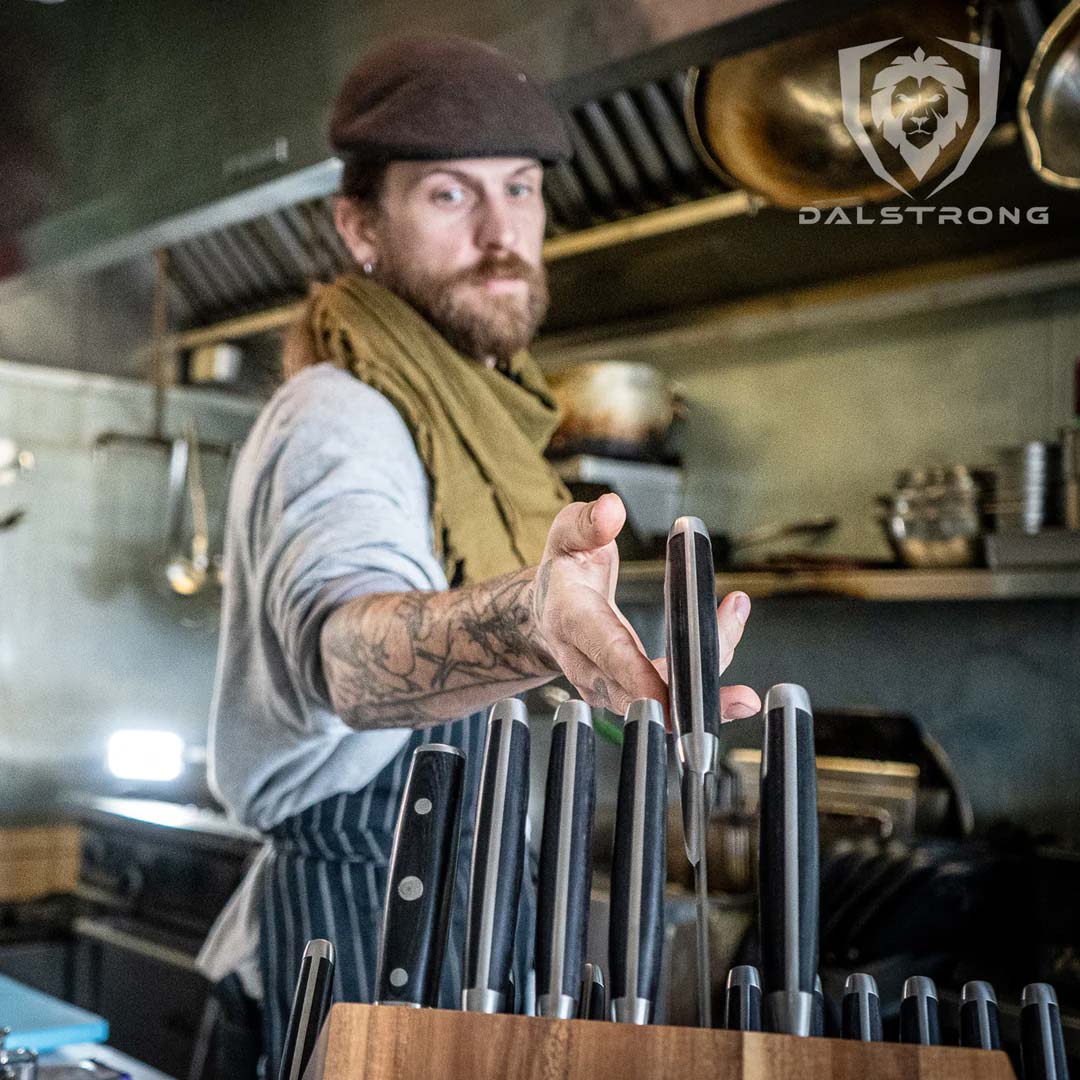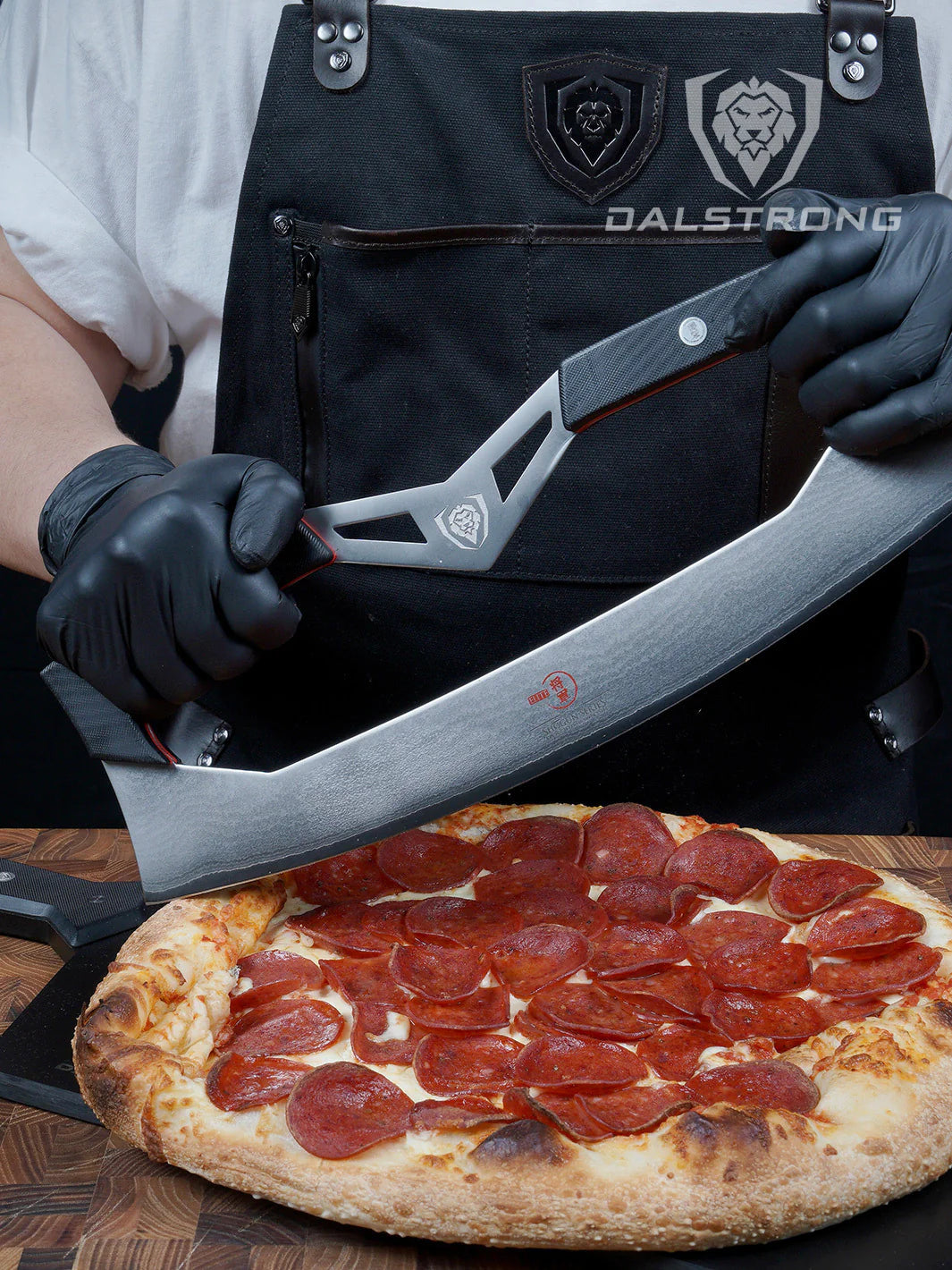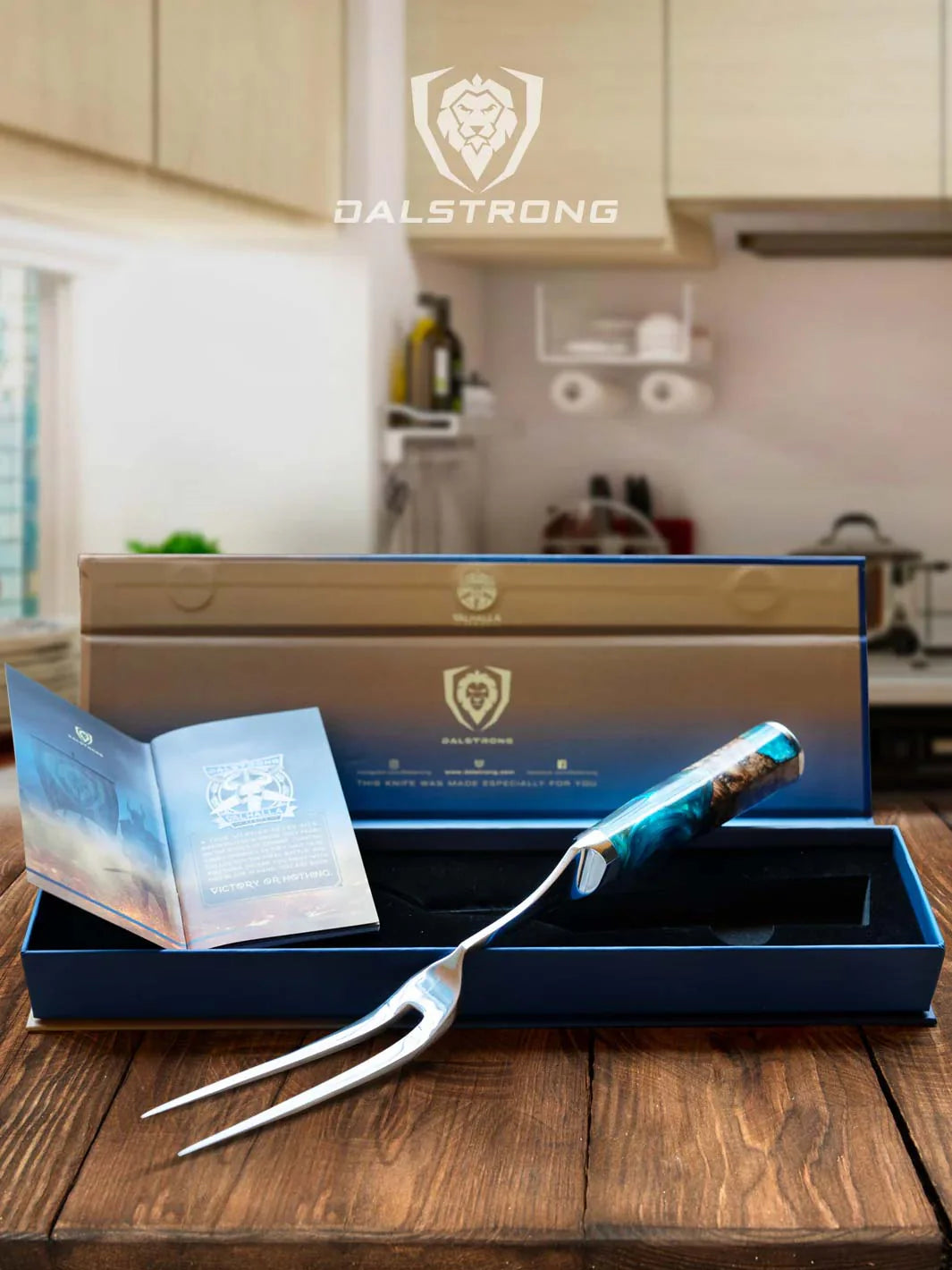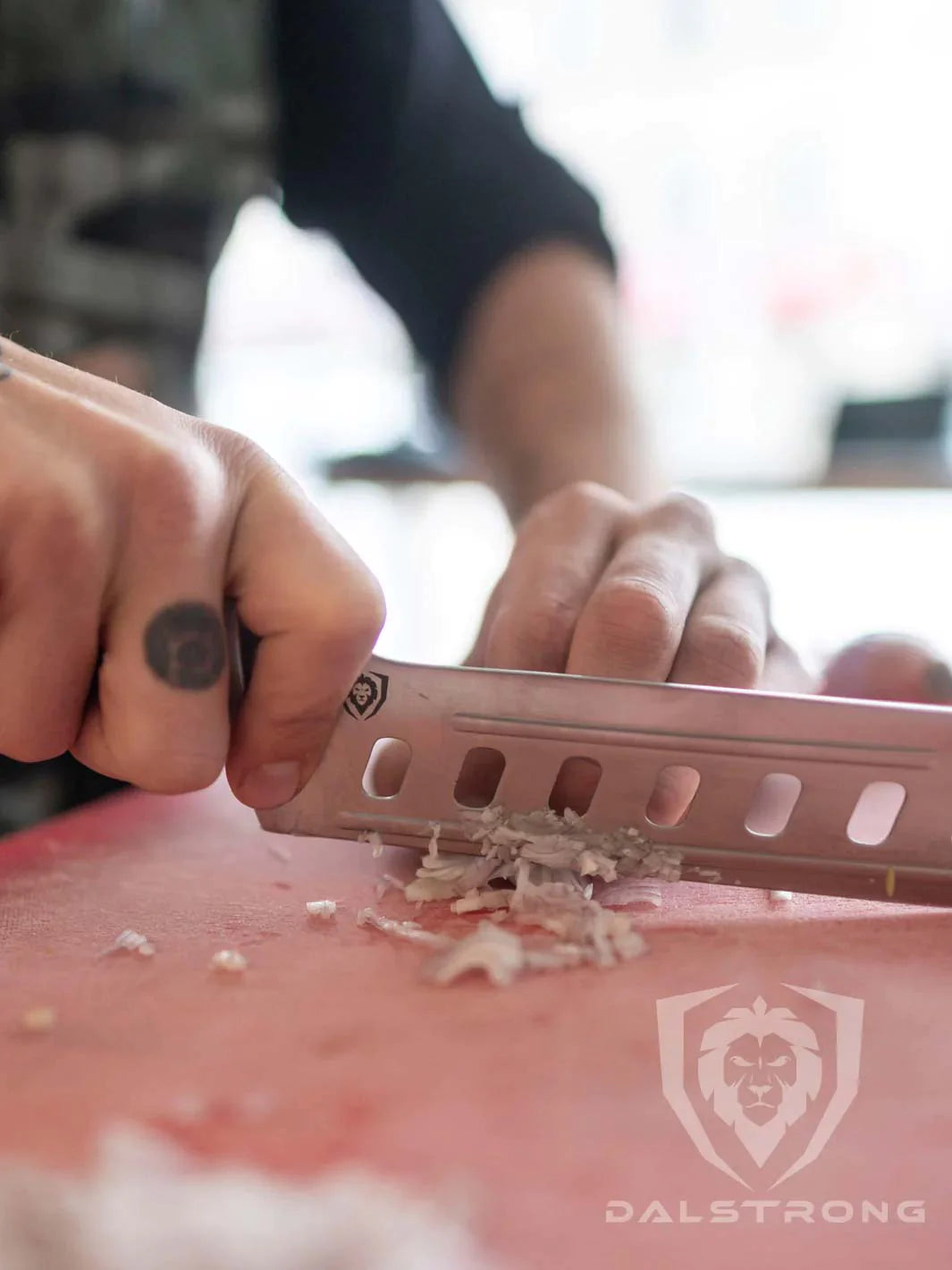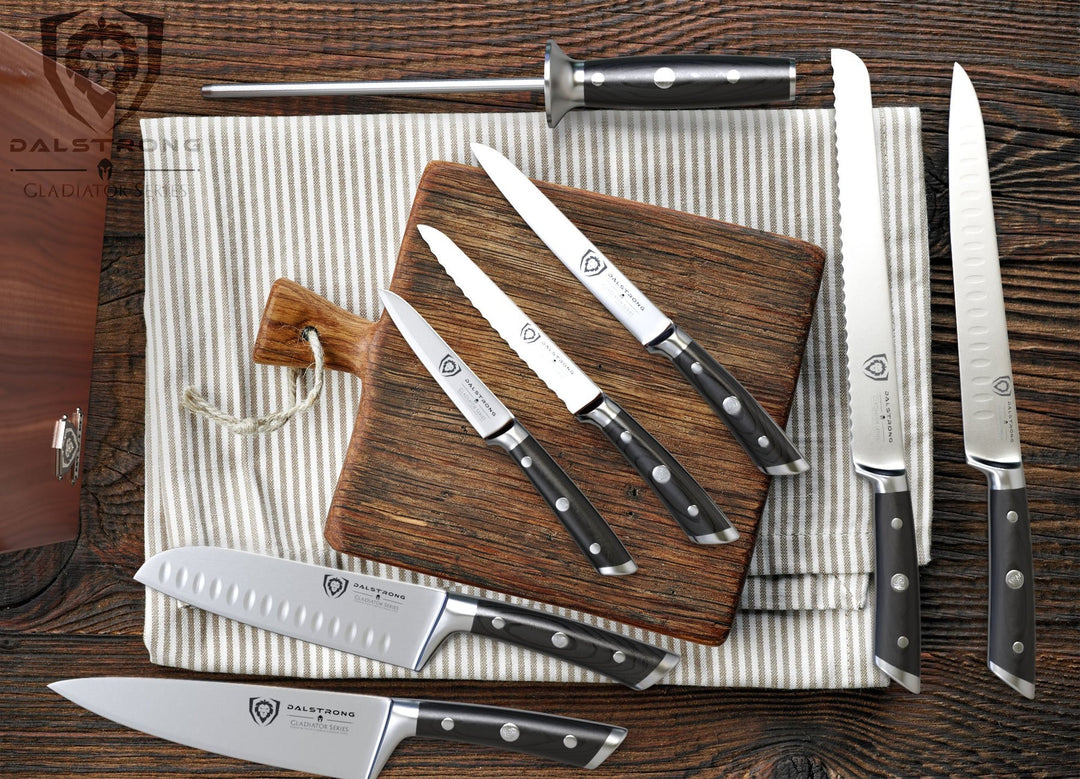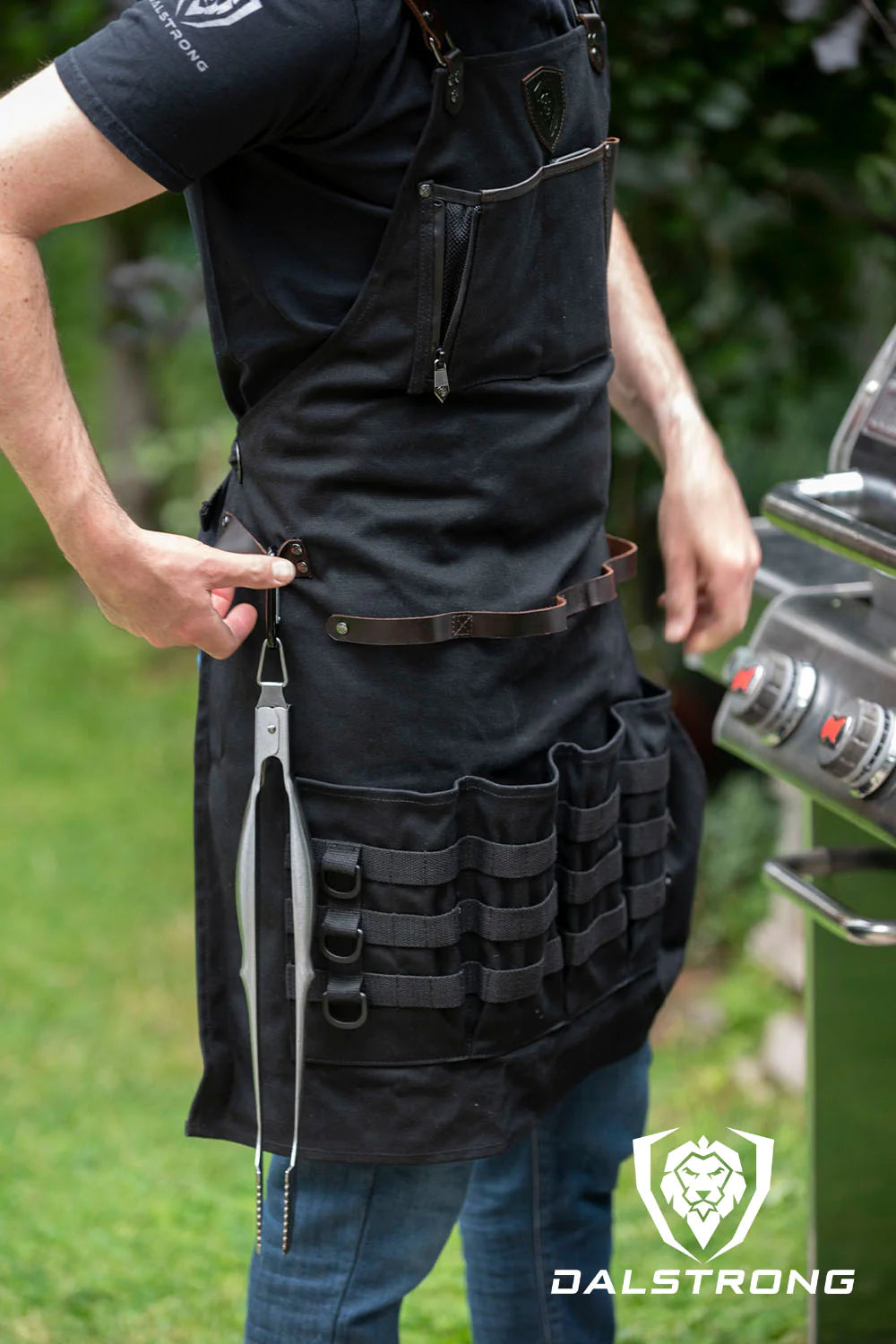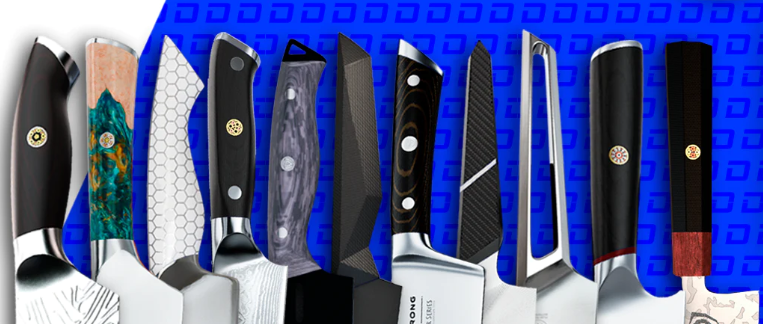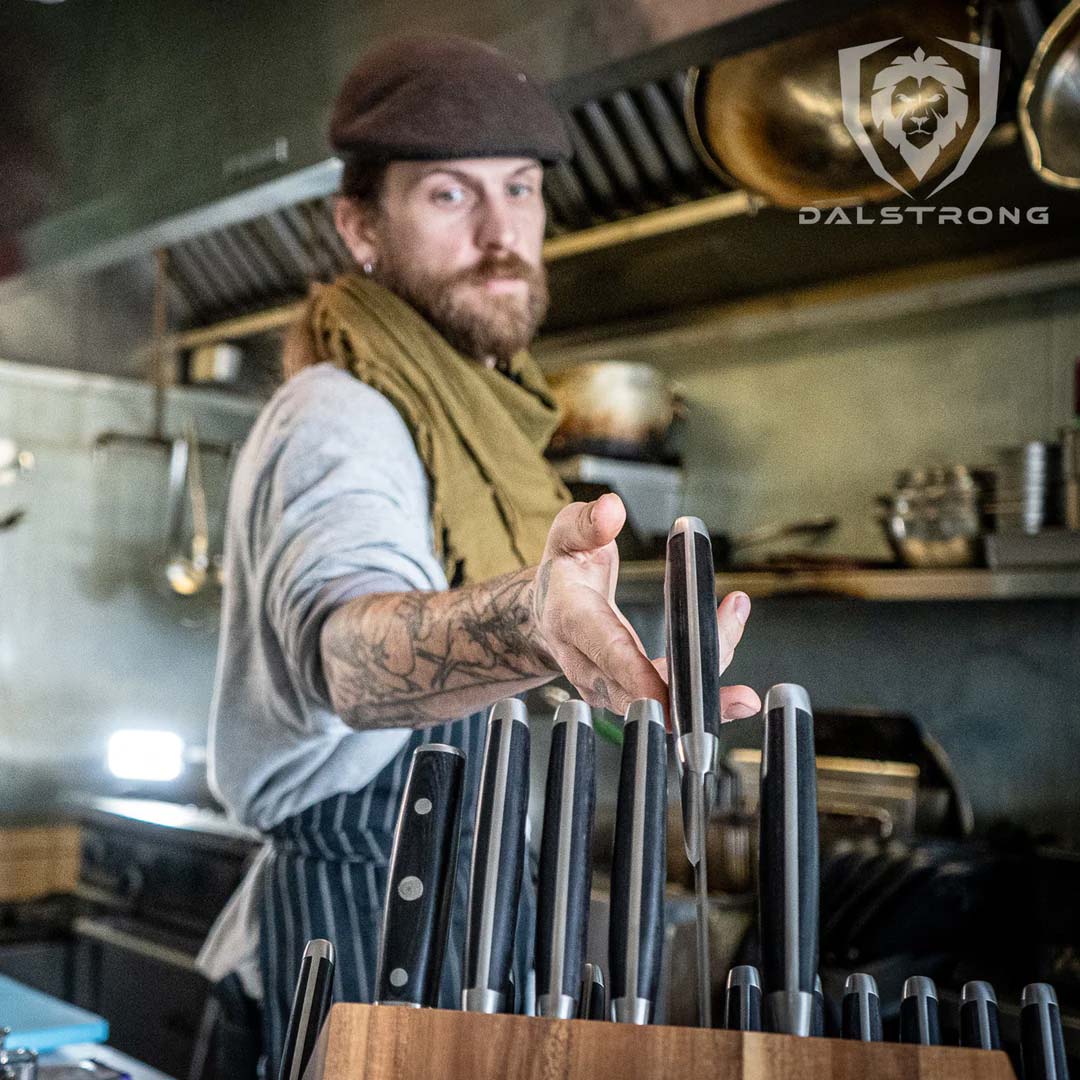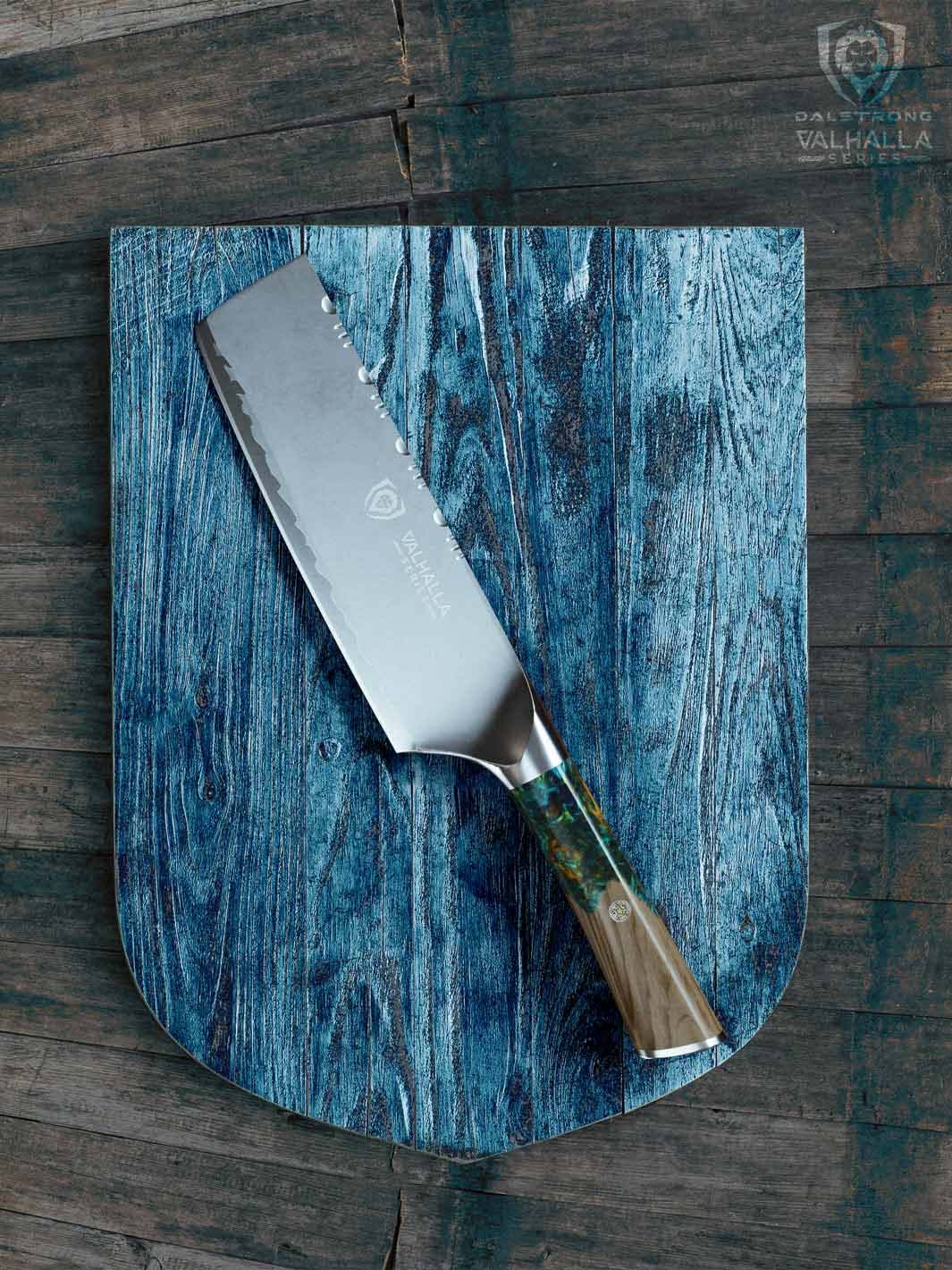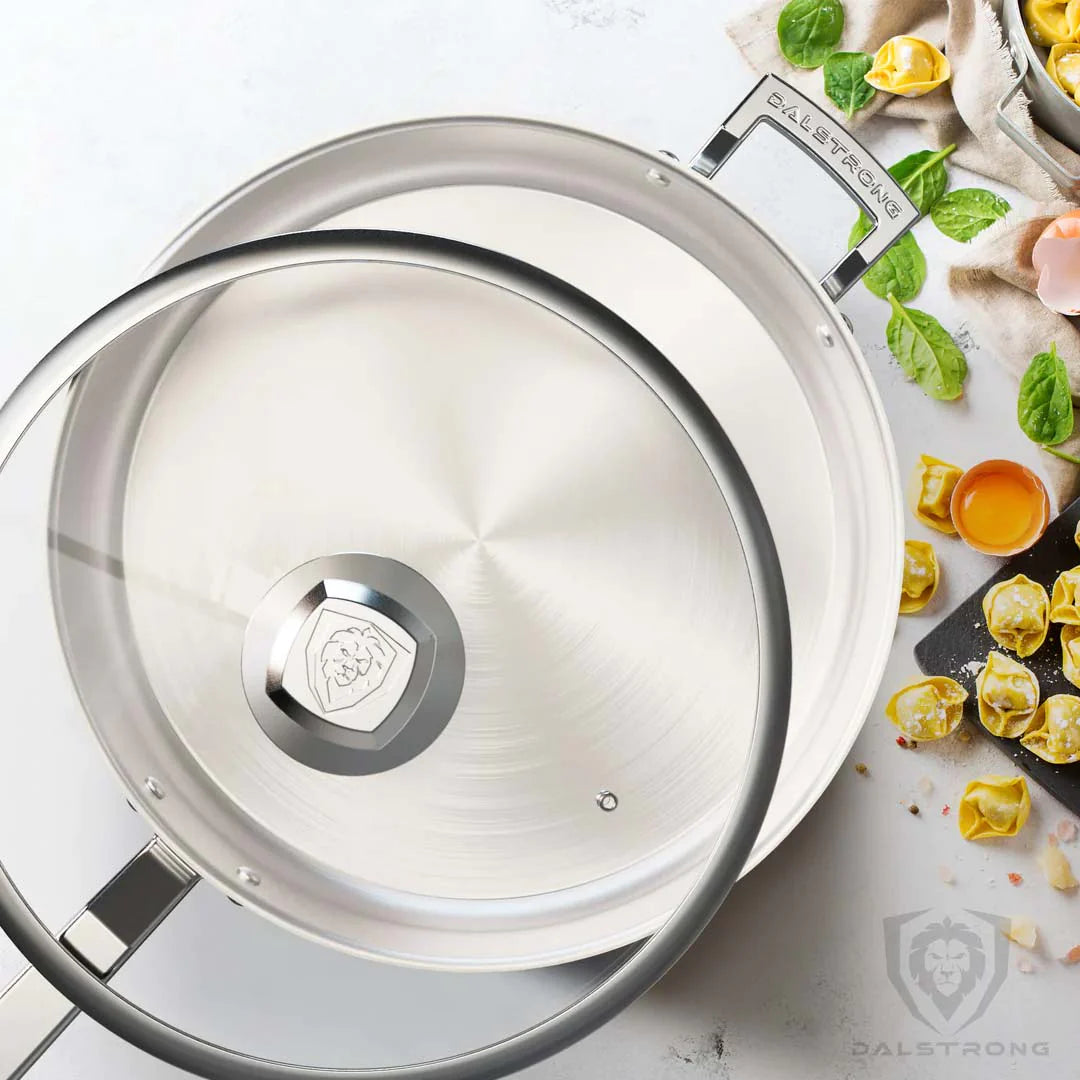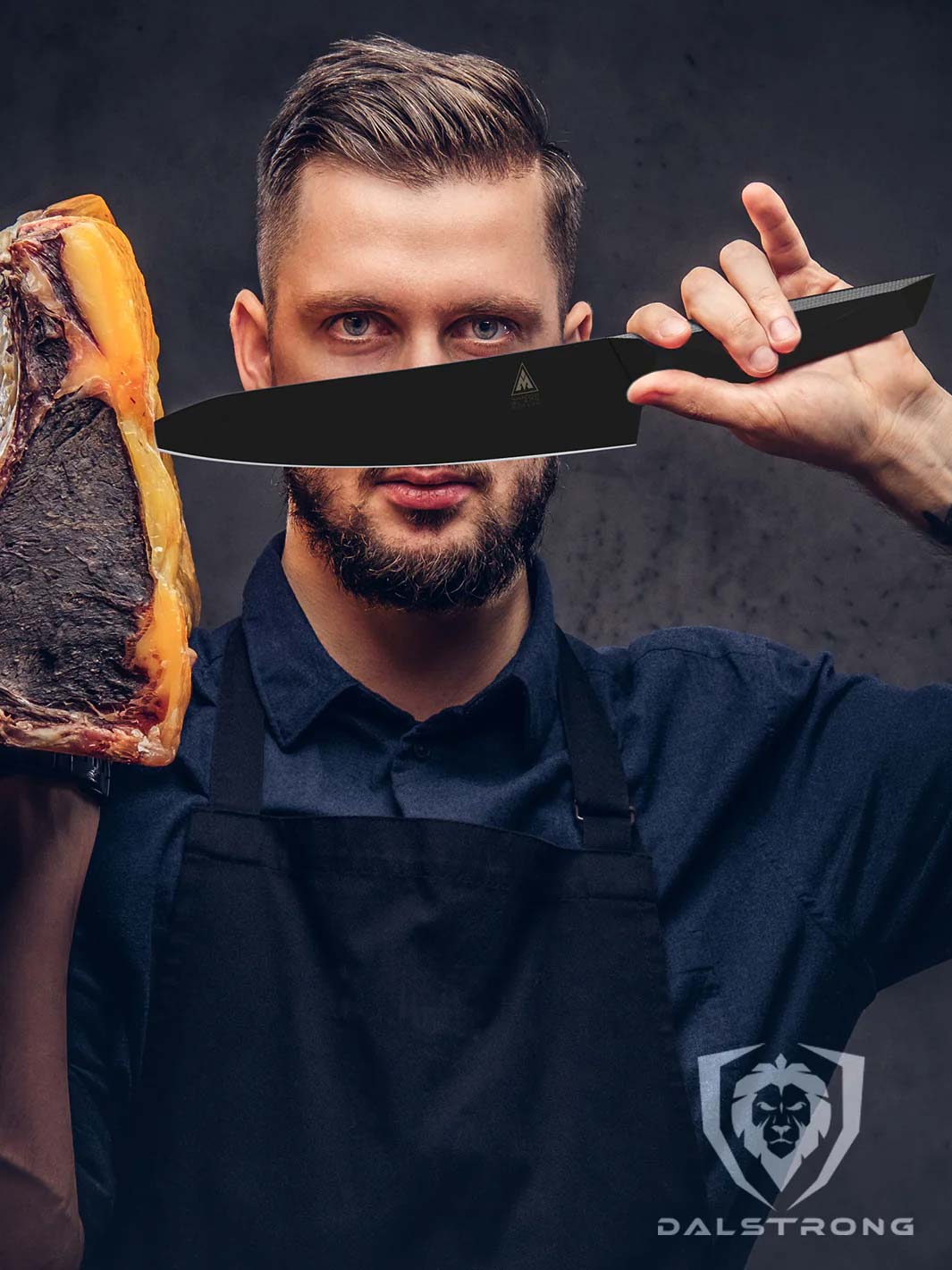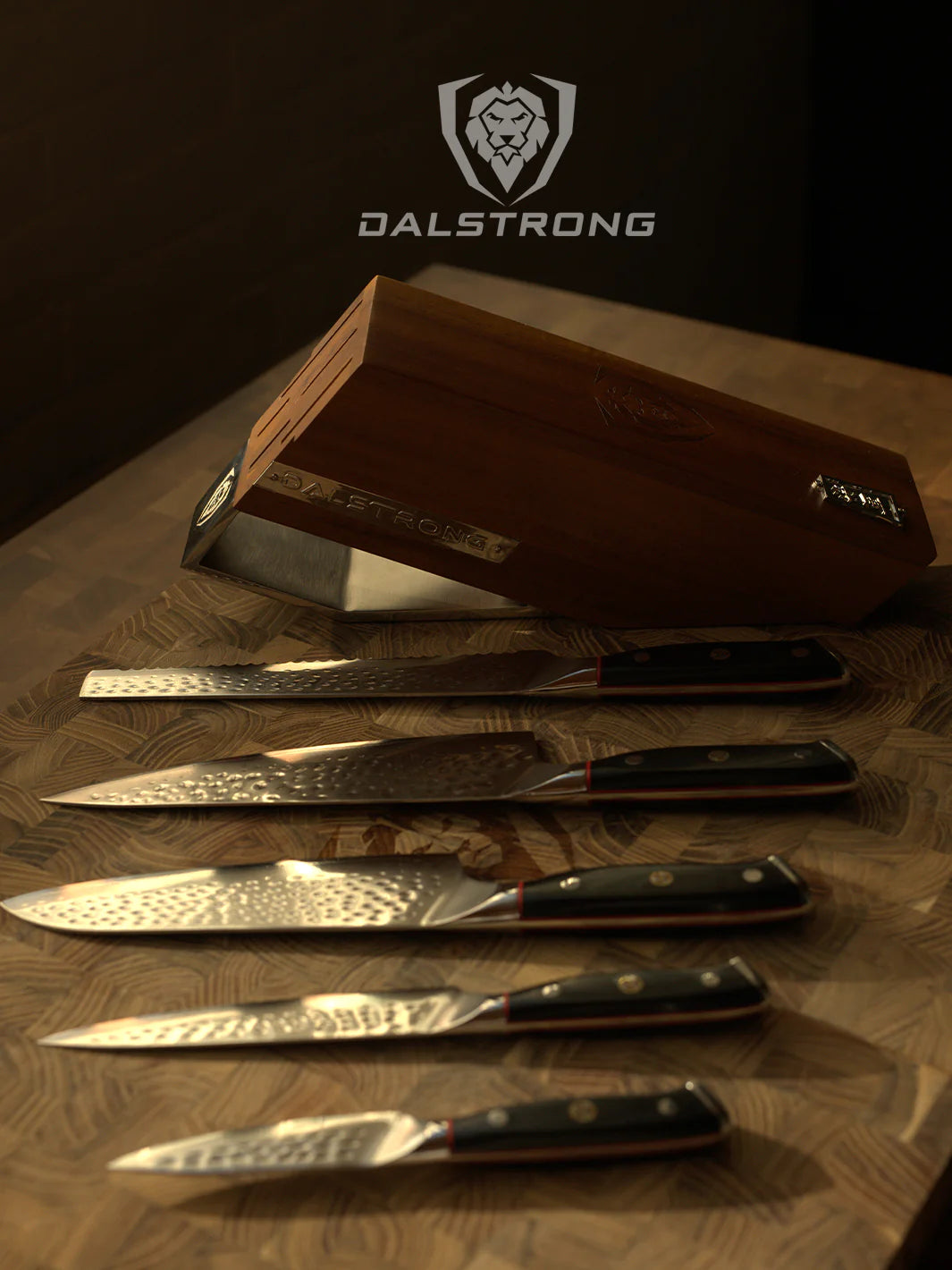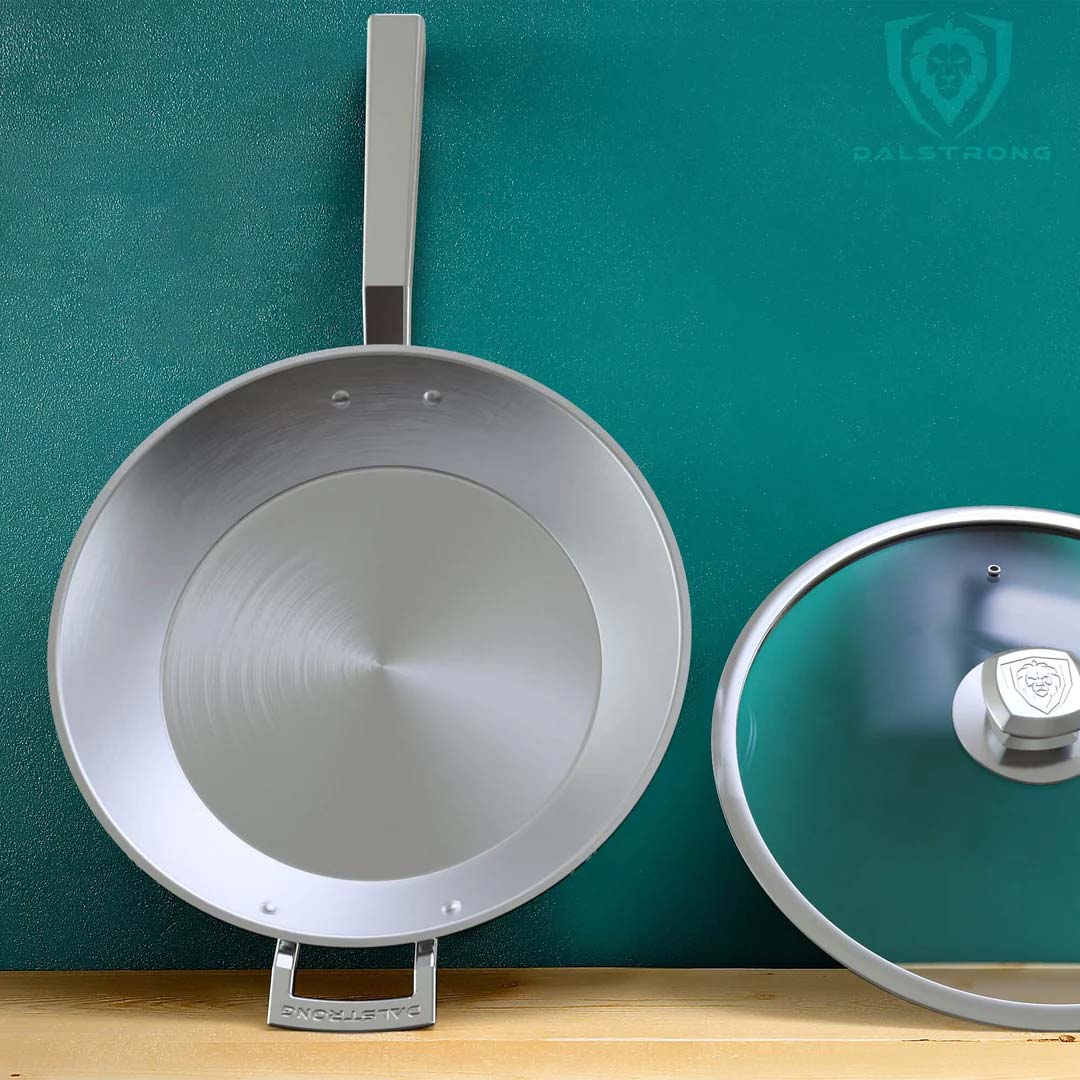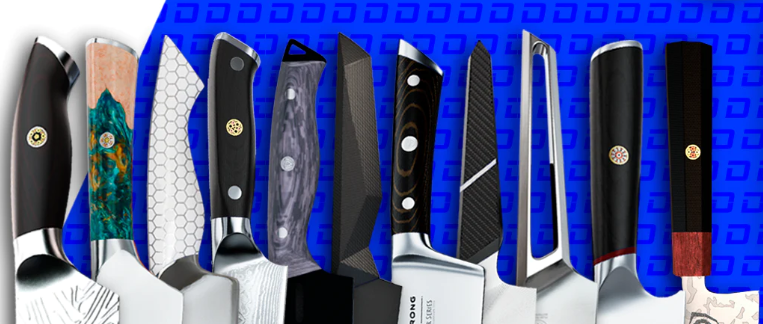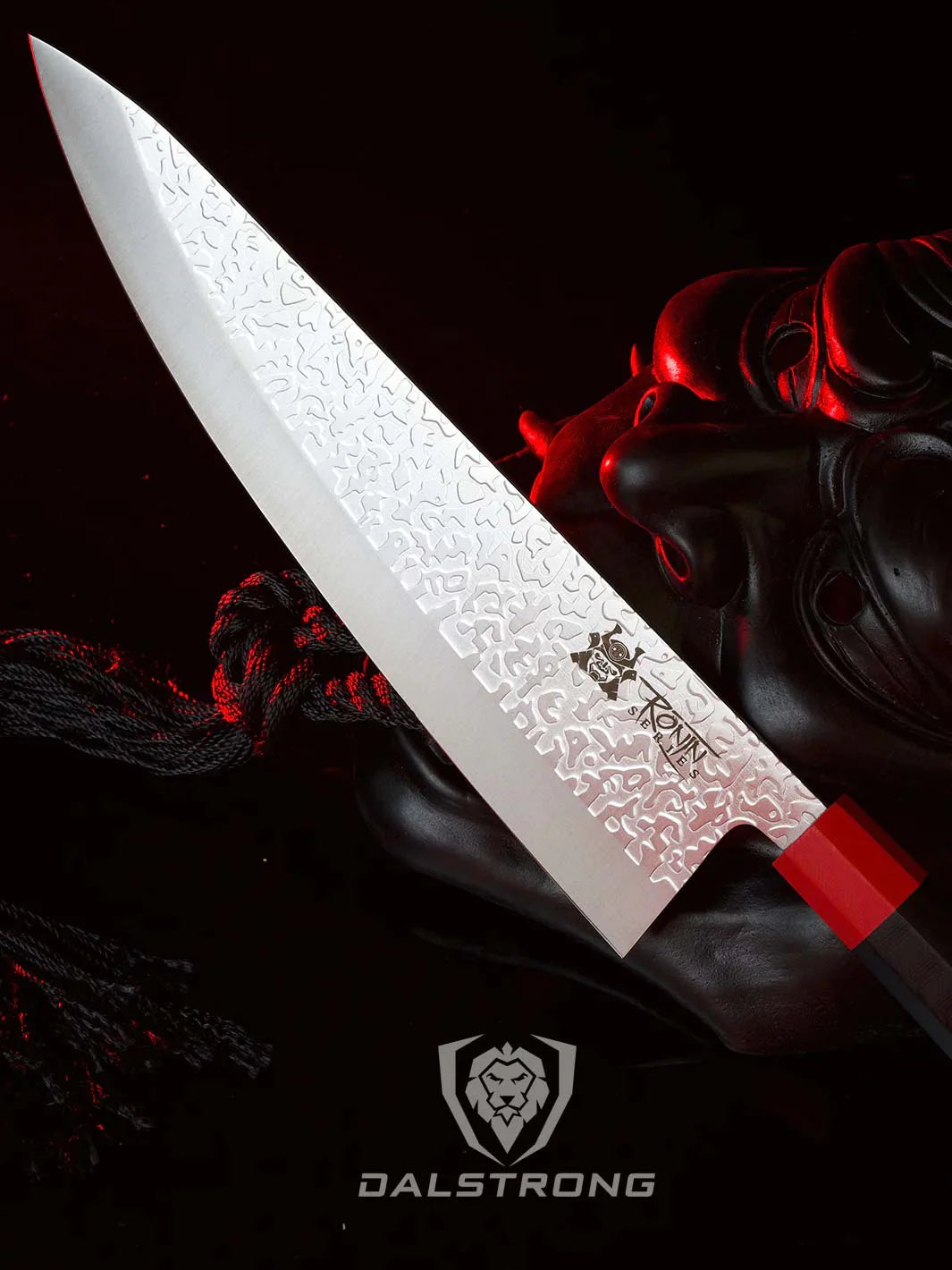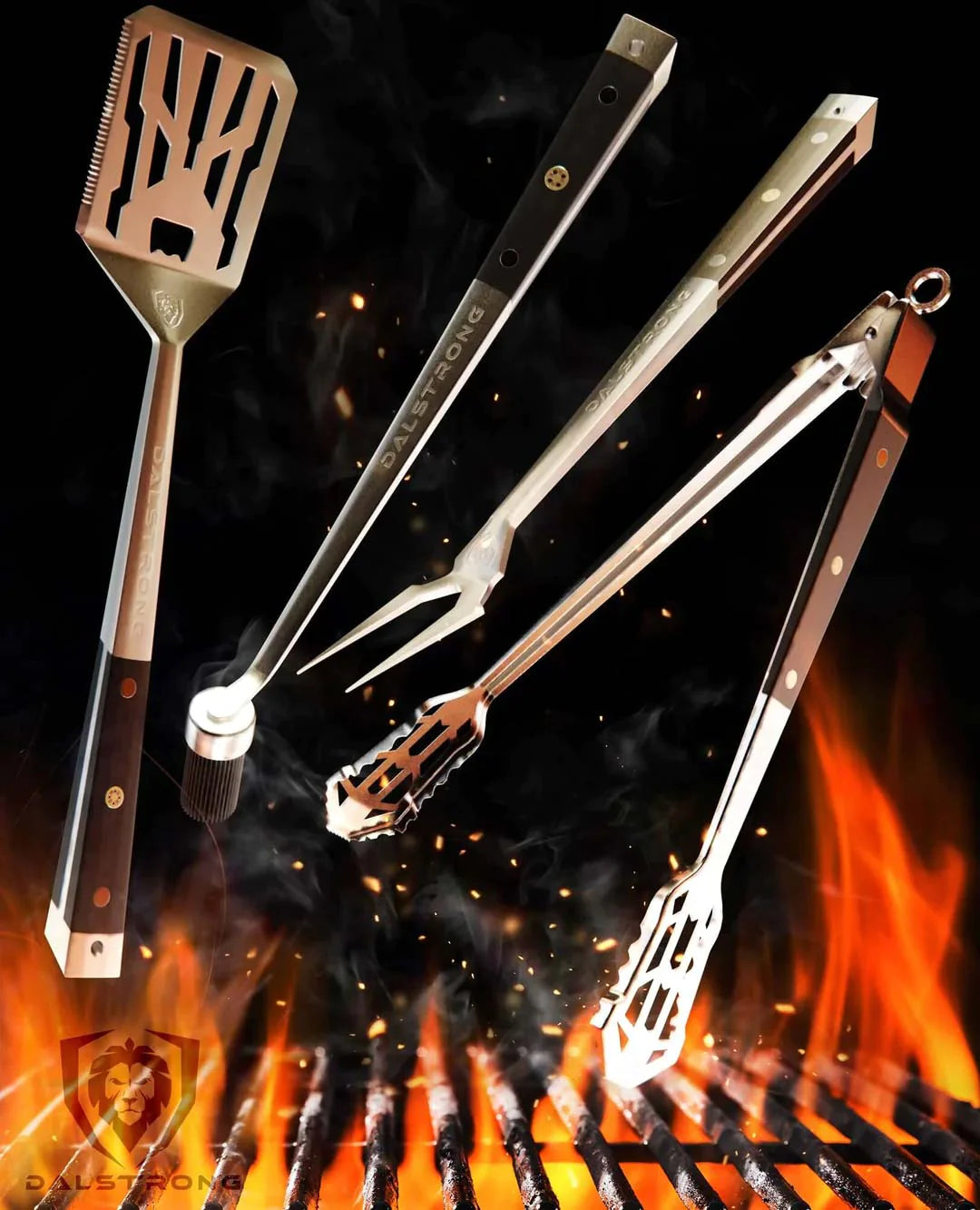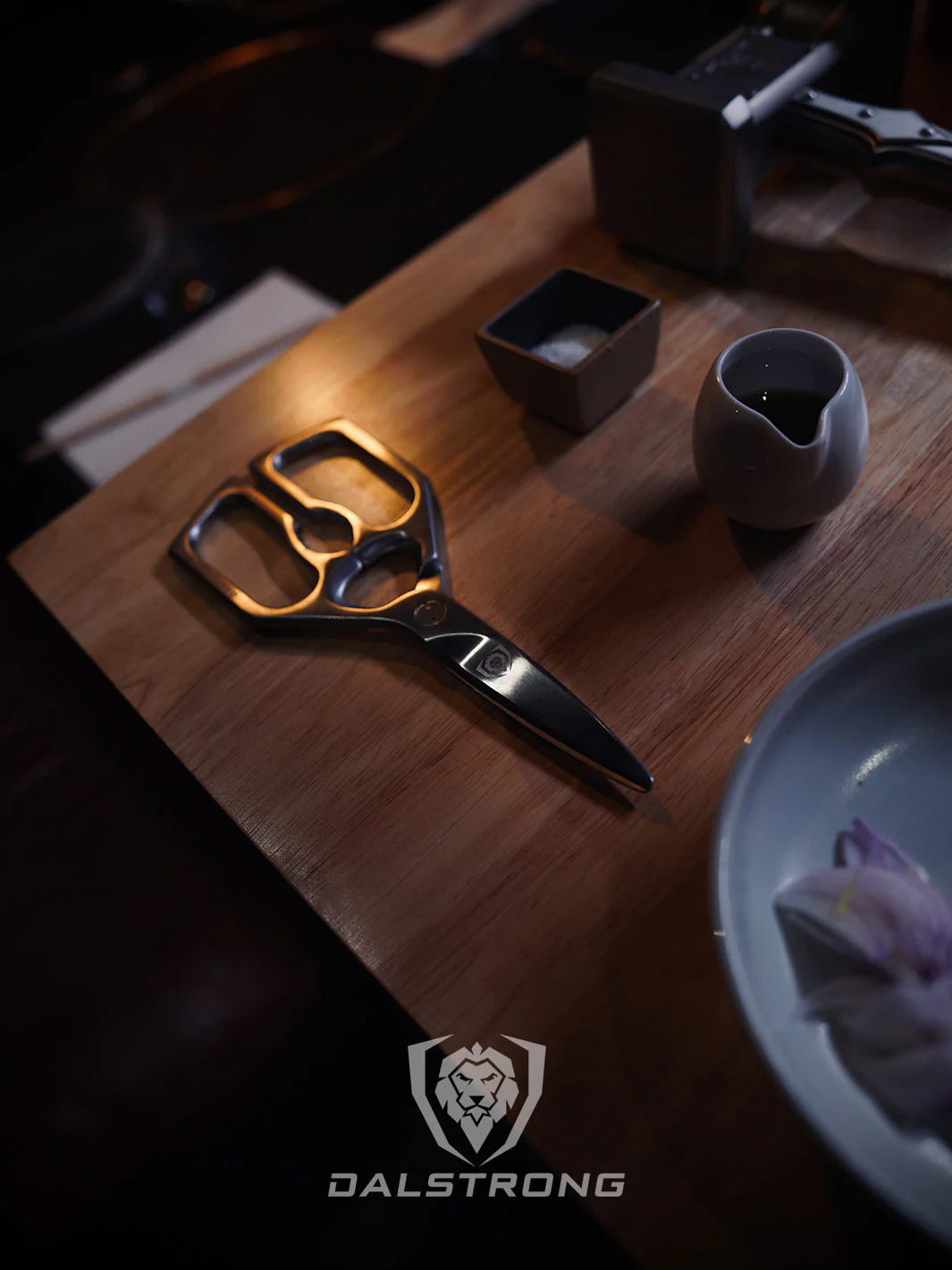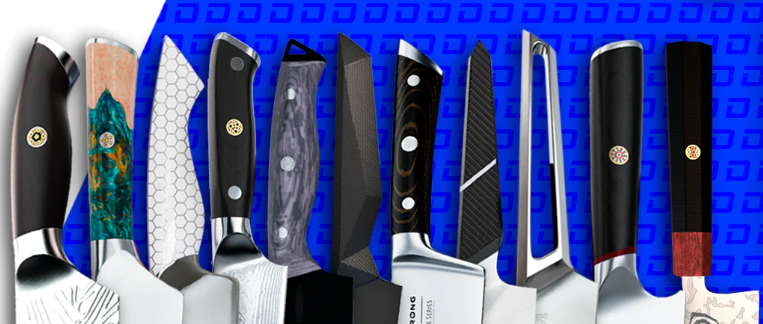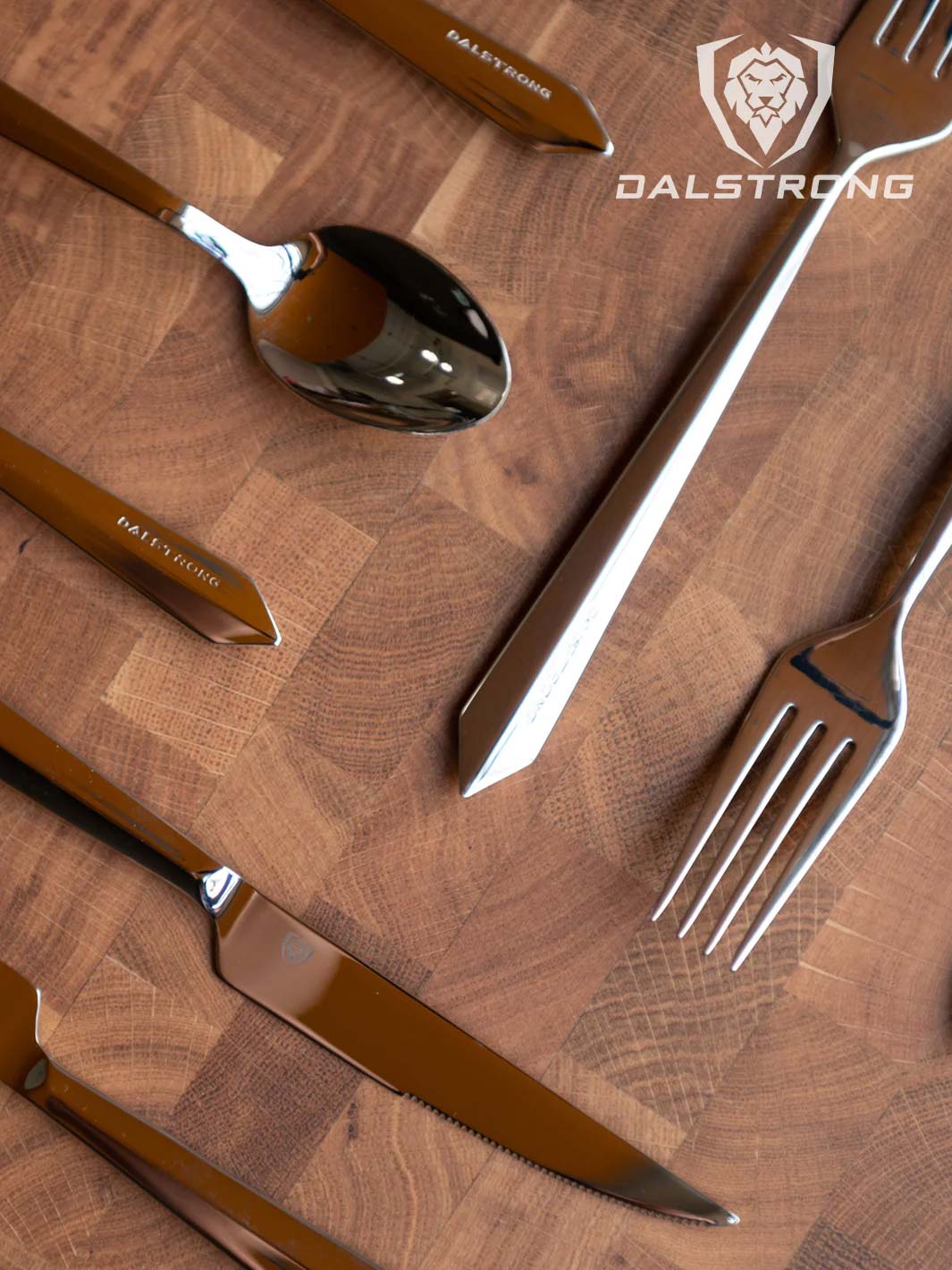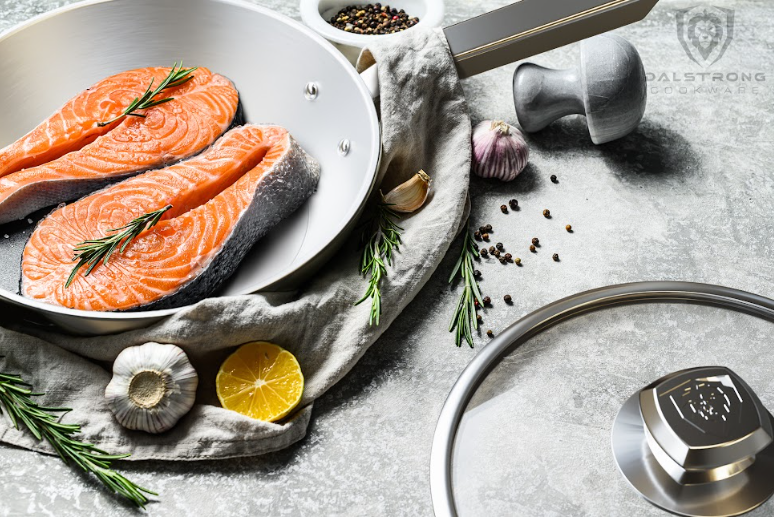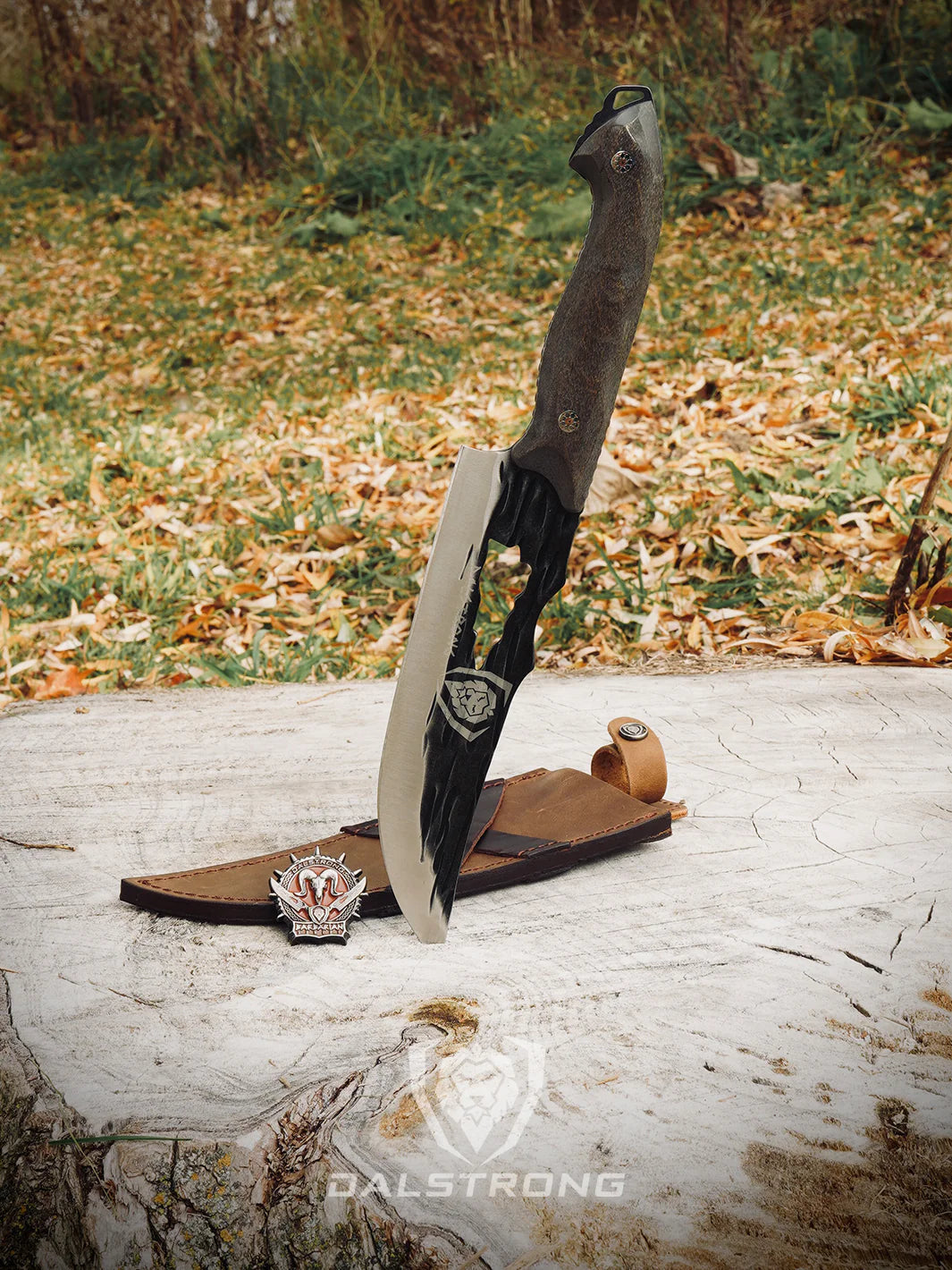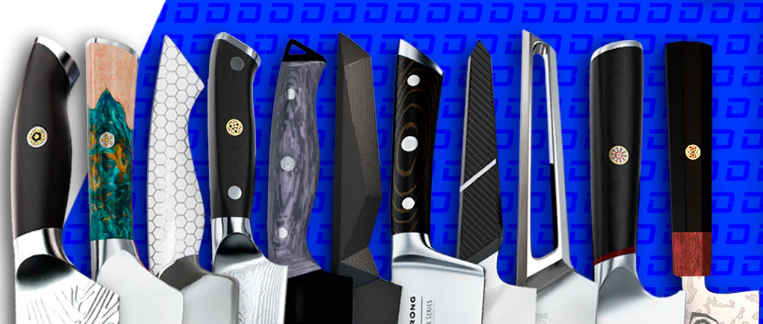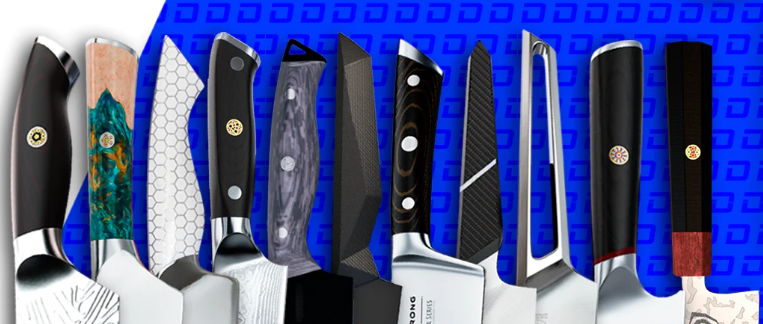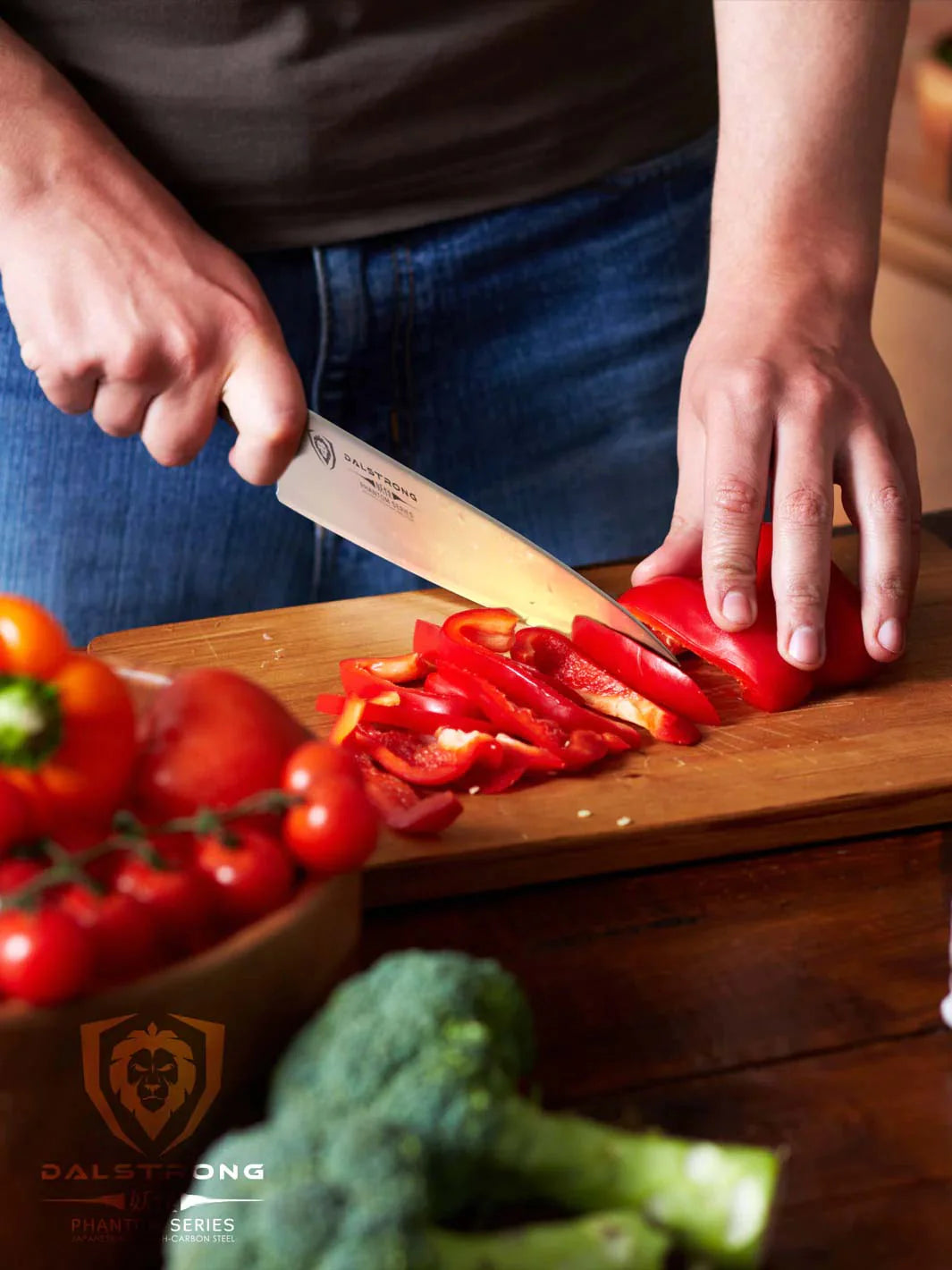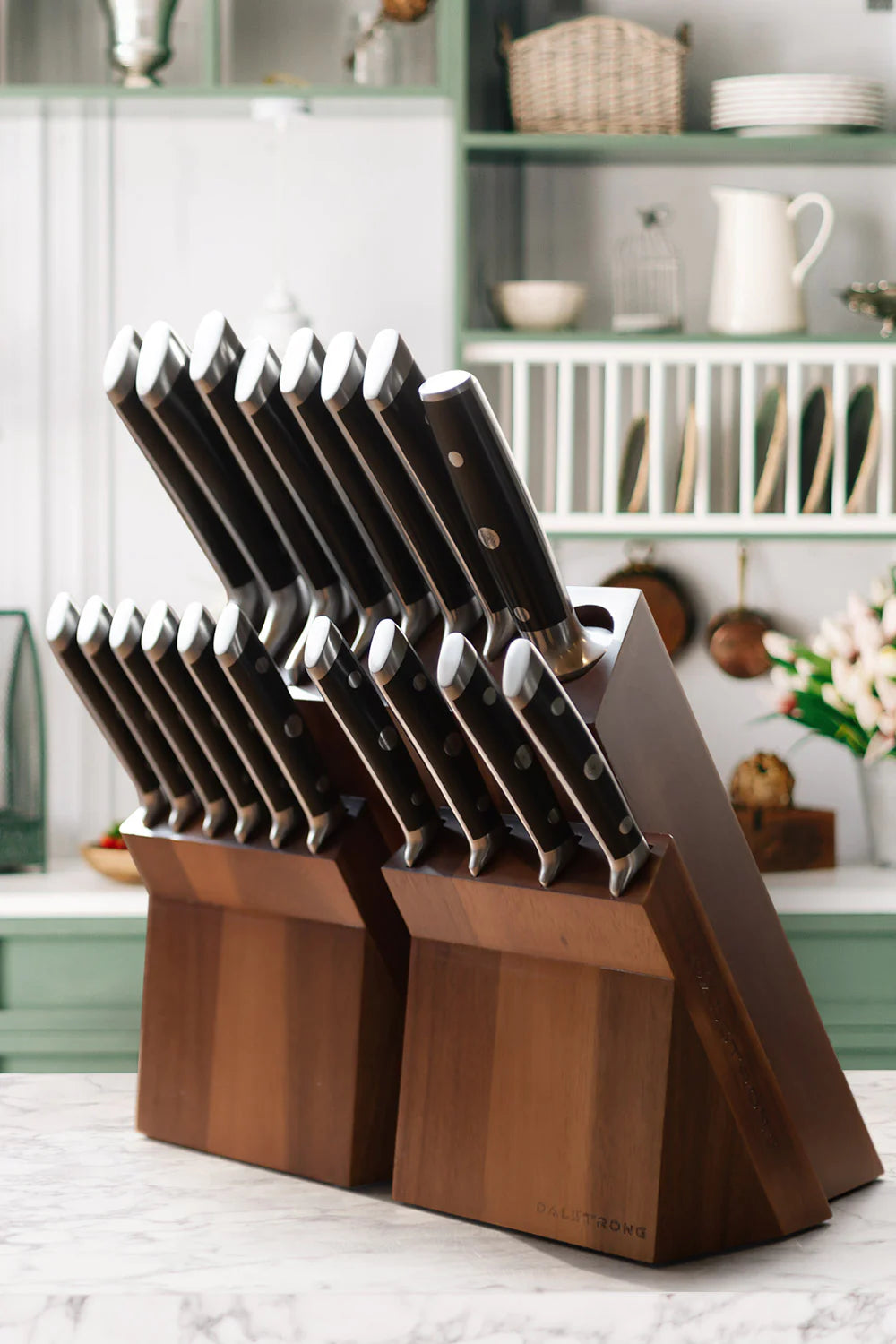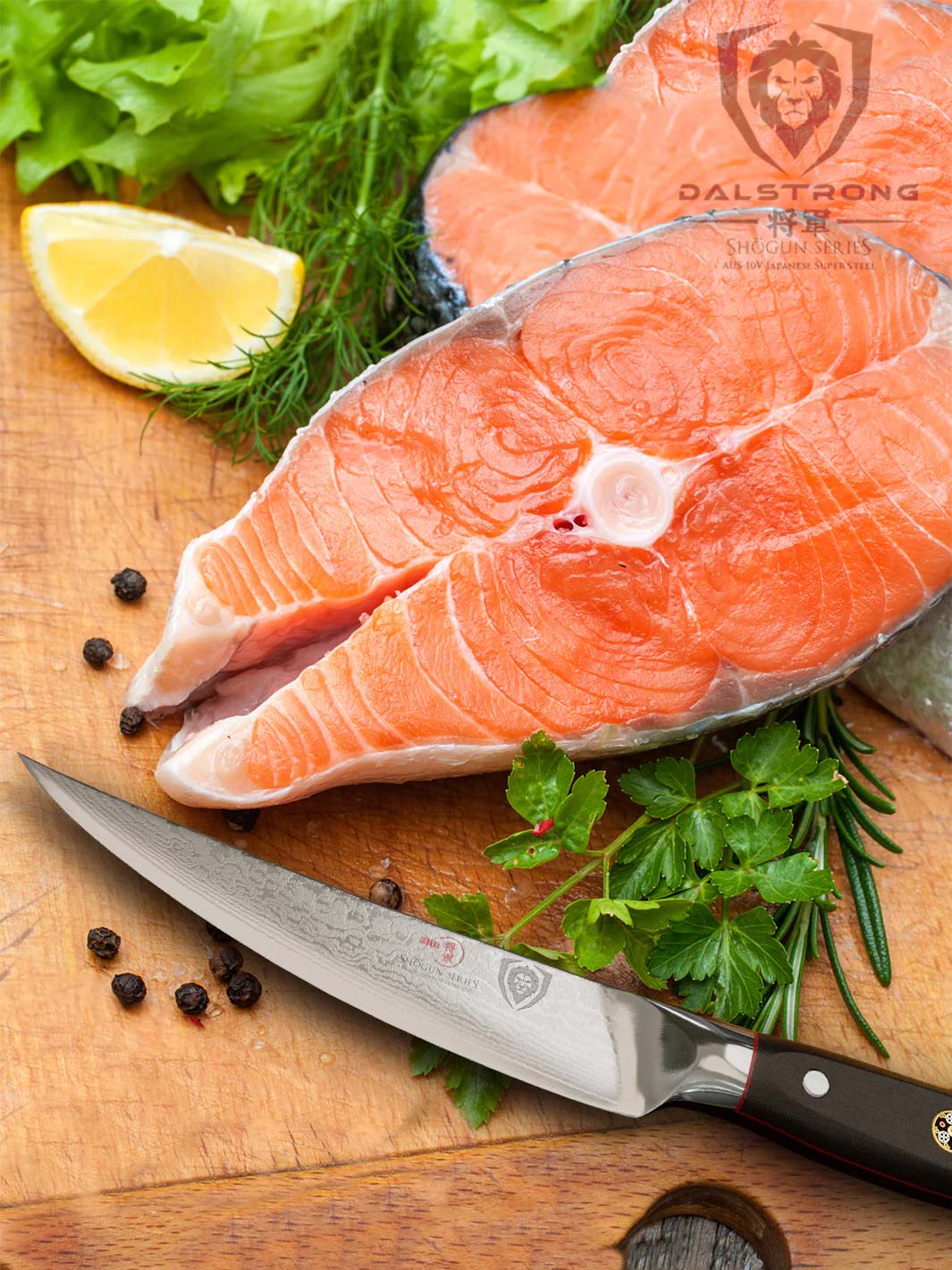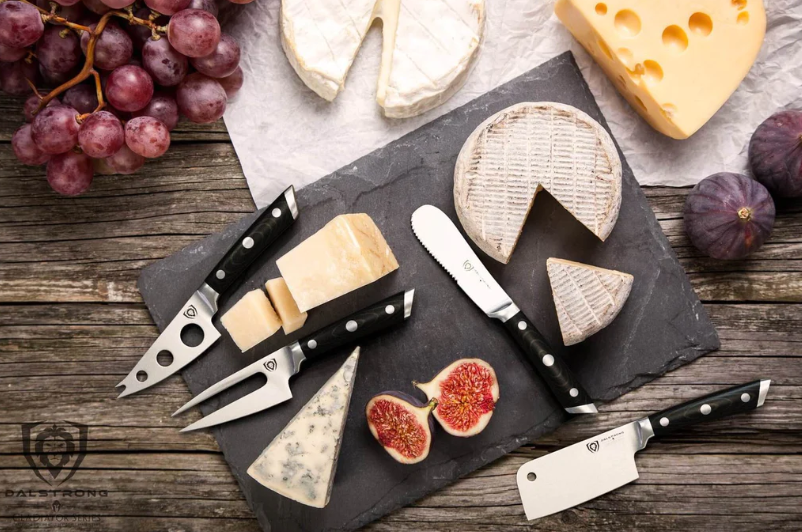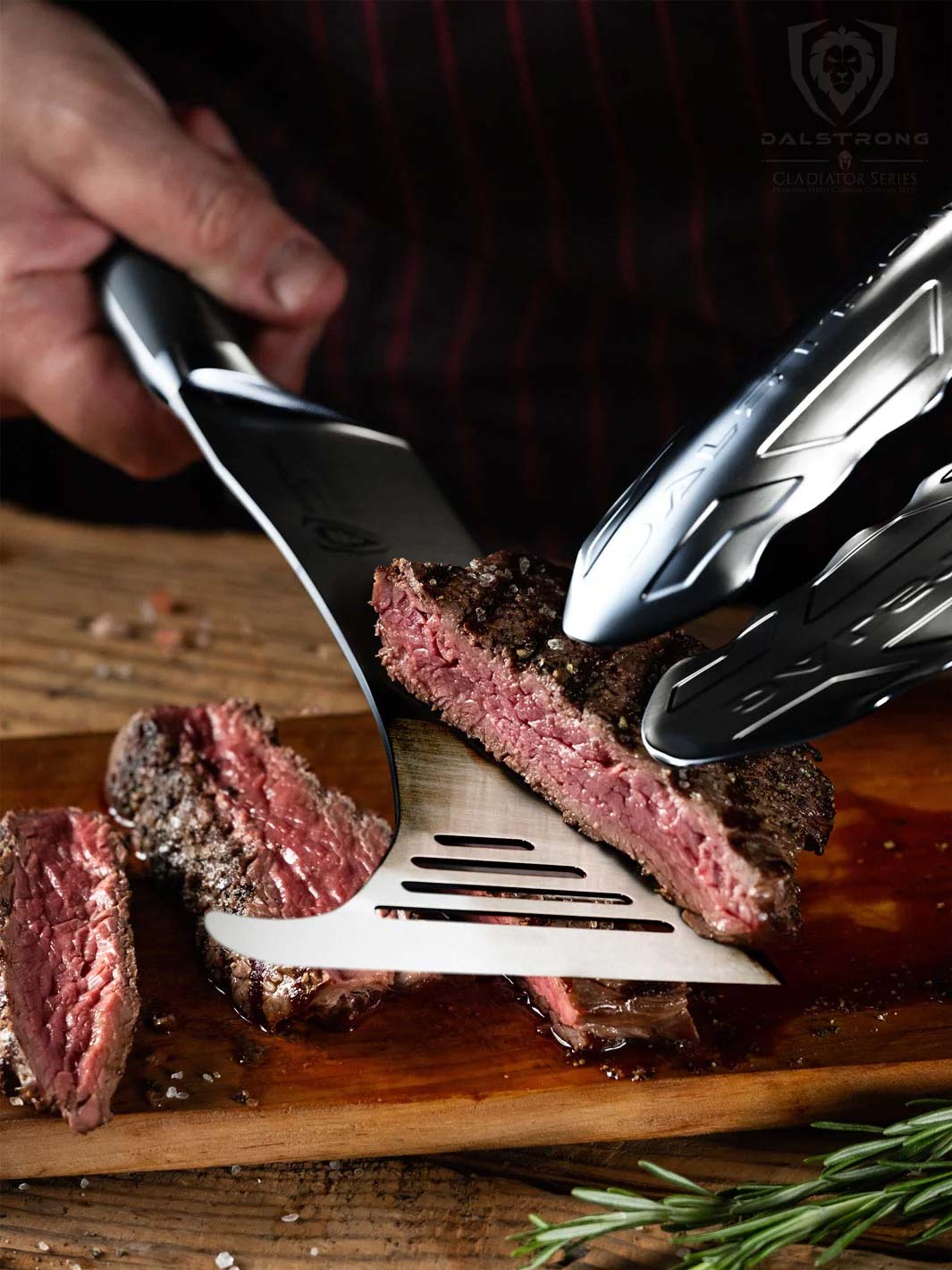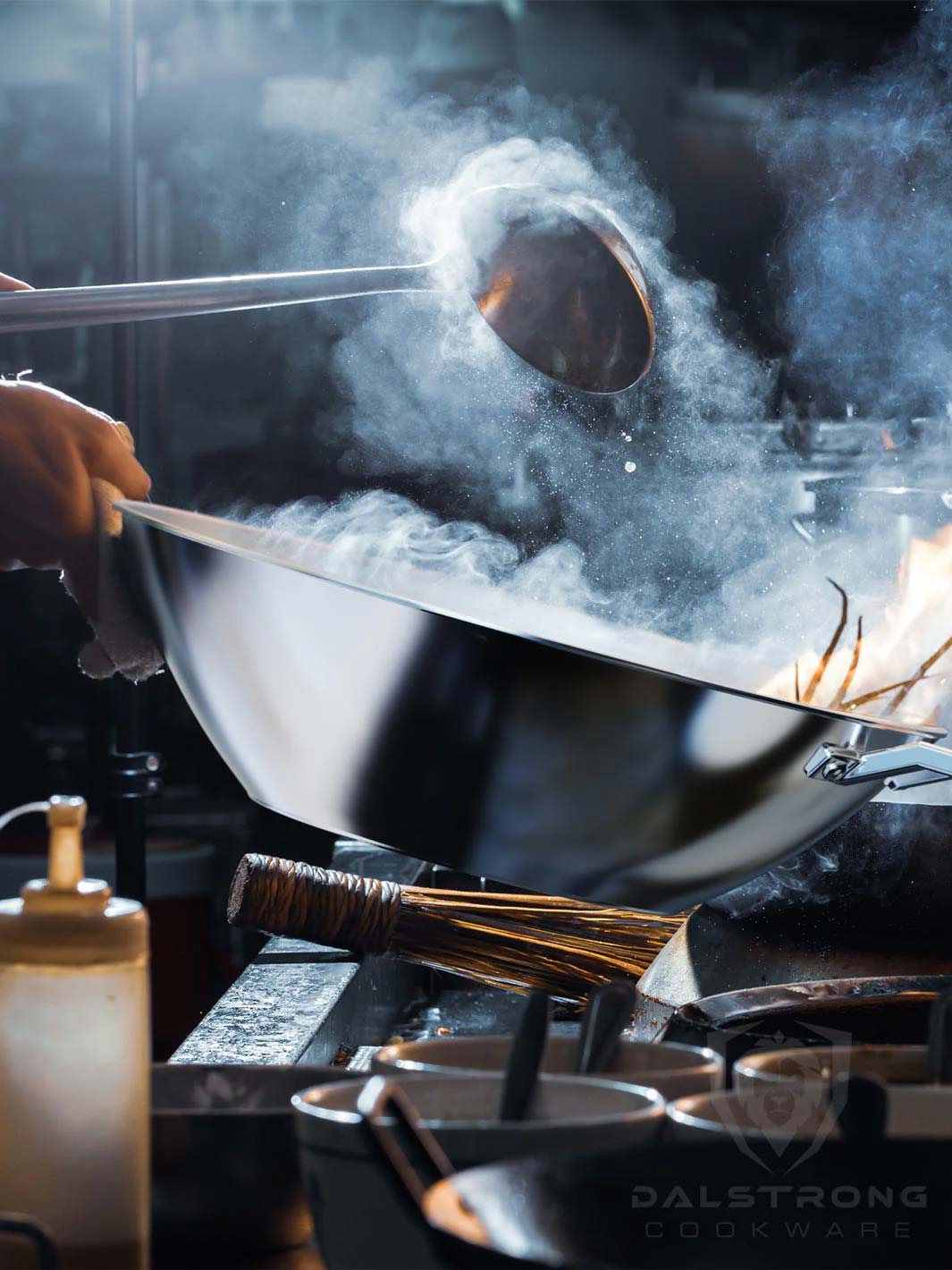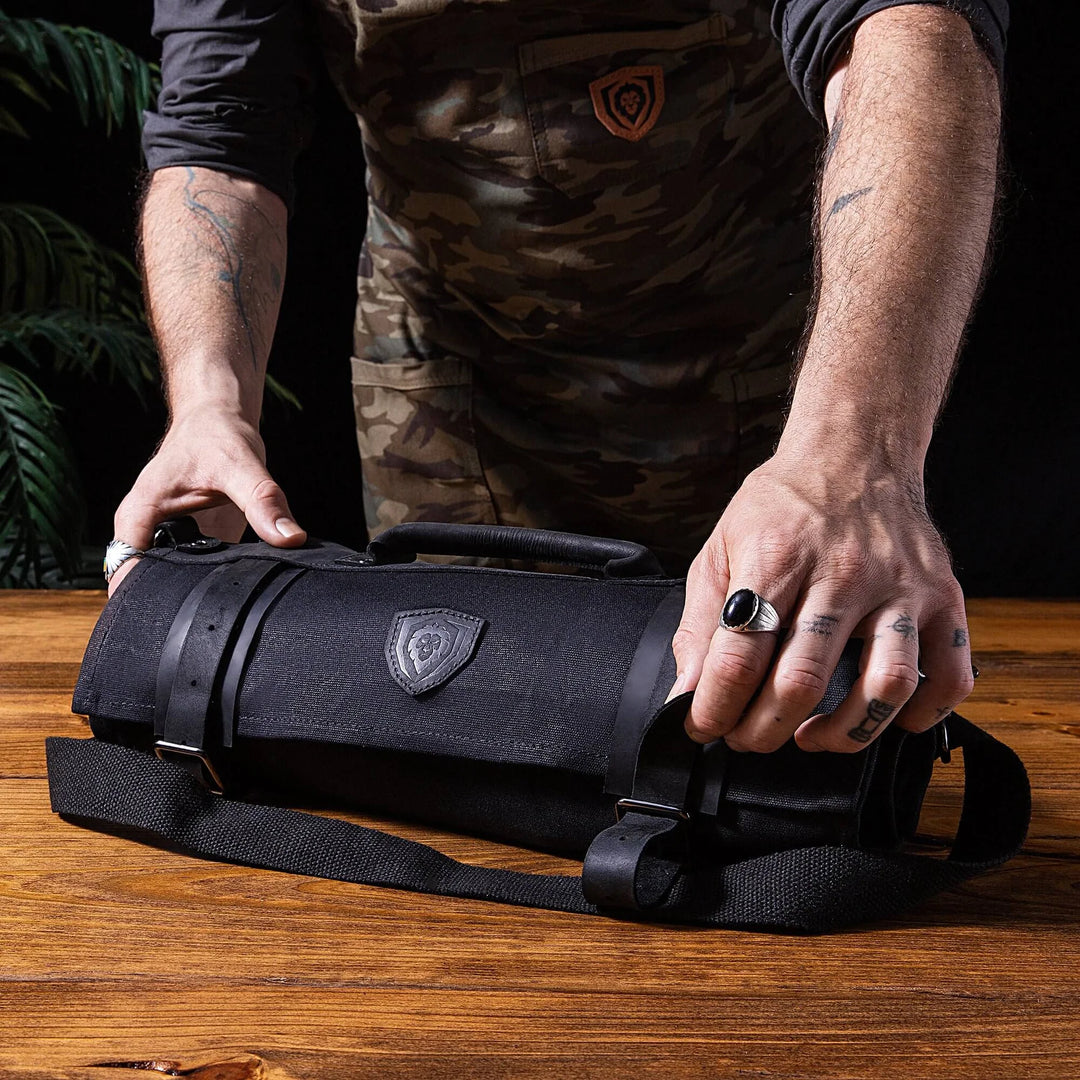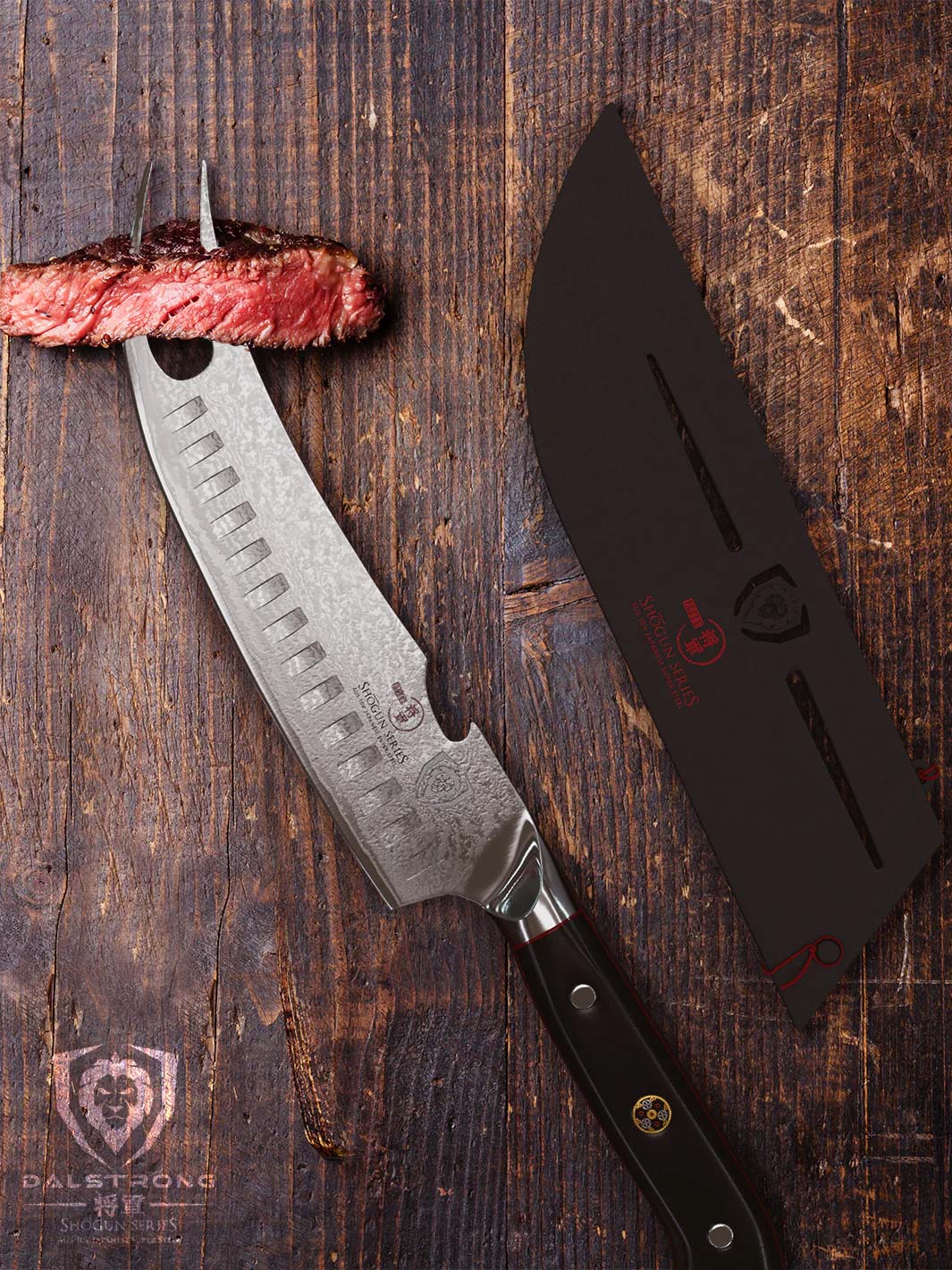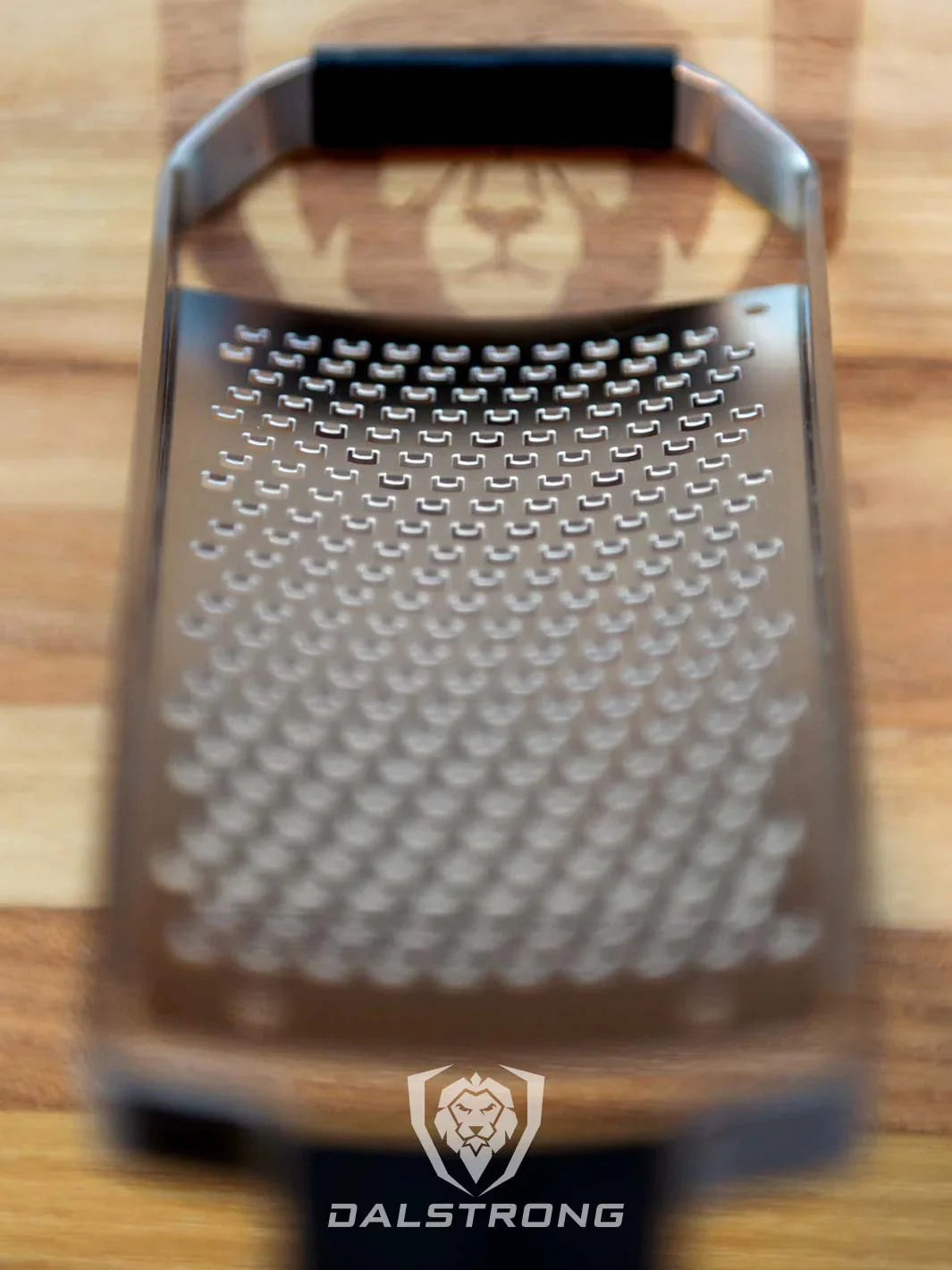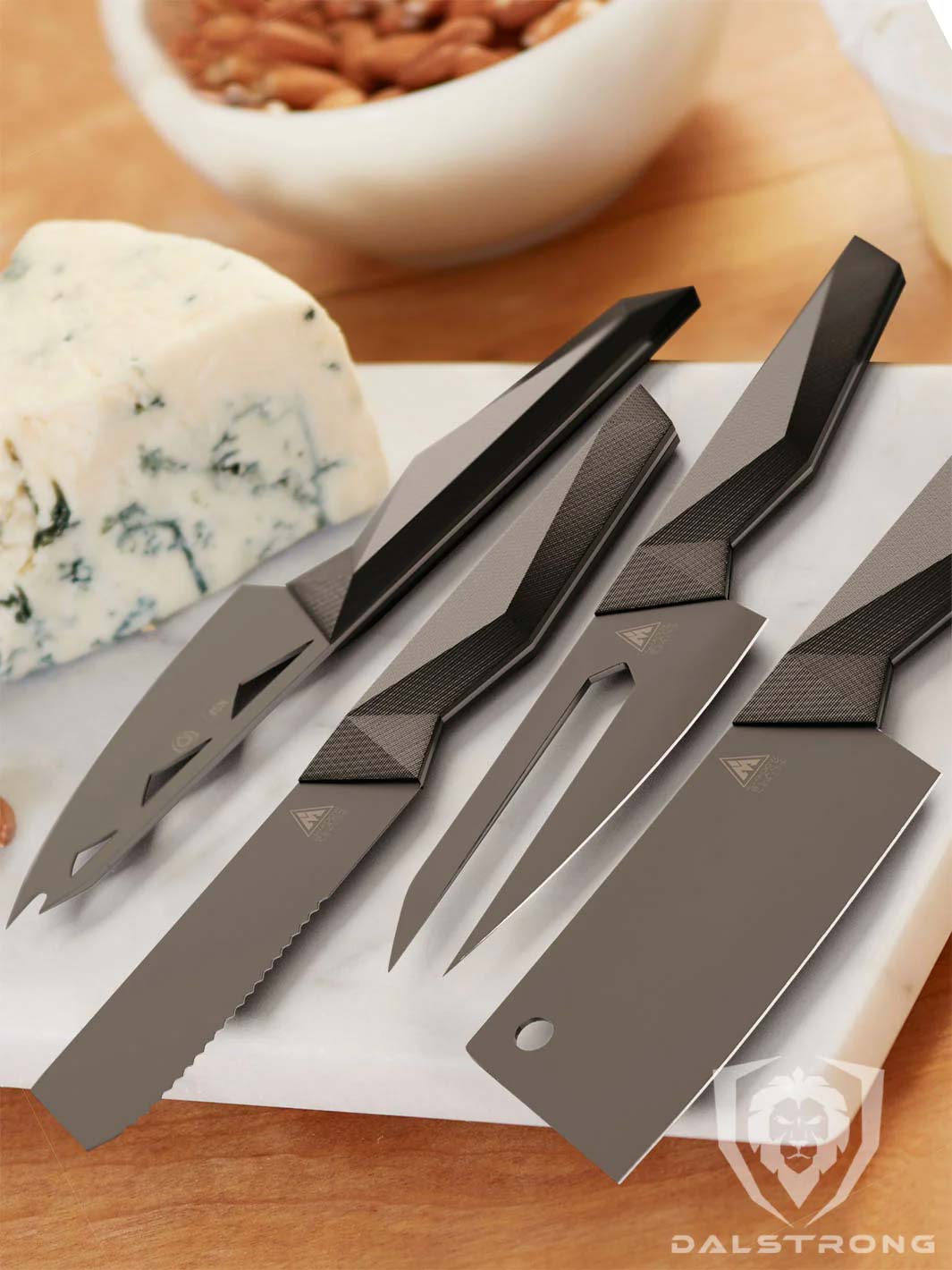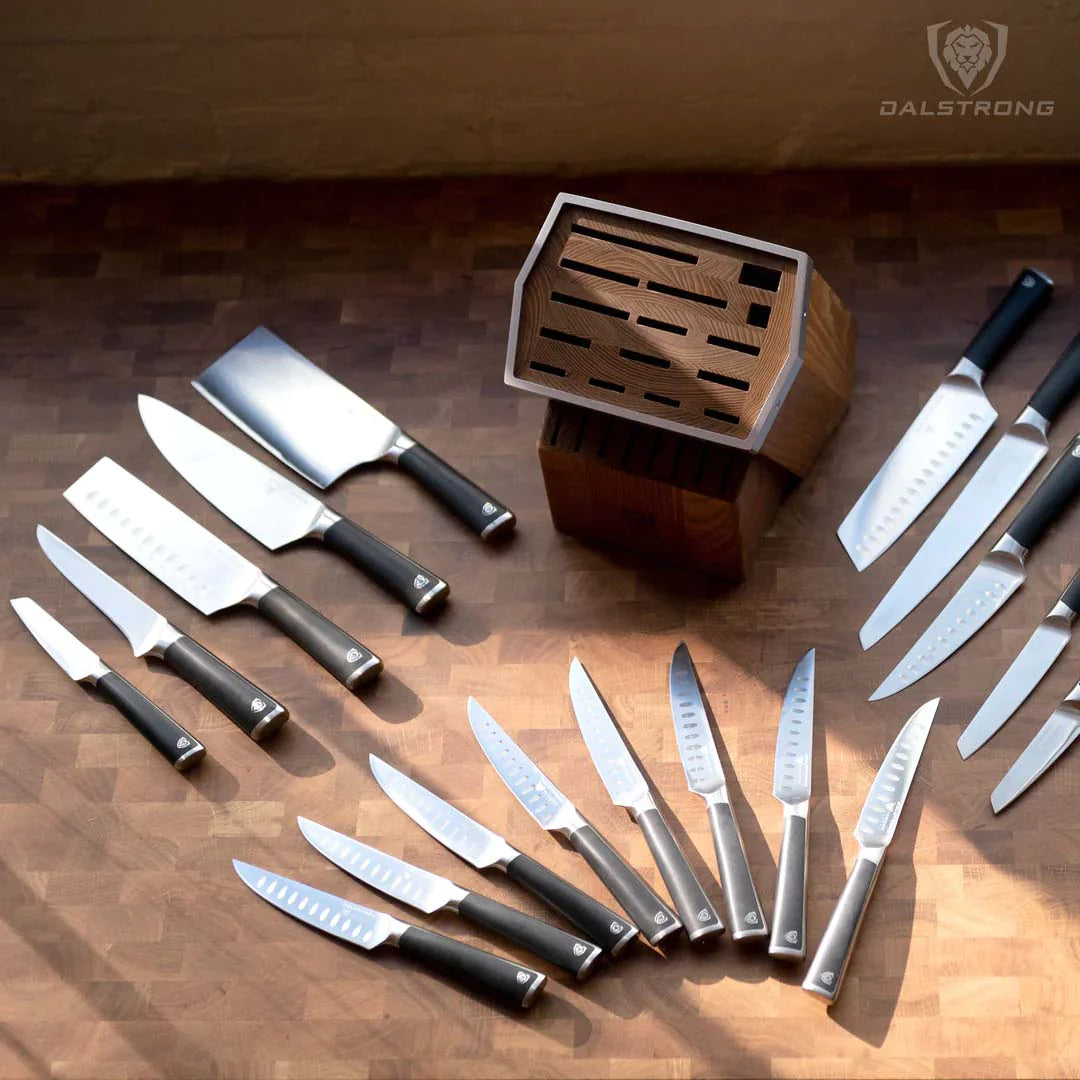Dalstrong’s Most Popular and Best Knives For Chefs
Shogun Series ELITE BBQ Pitmaster & Meat Knife 8"
“That dice is so precise!” – This is precisely what we all want to scream with our favorite knives, right, folks? The knife community is made up of the most versatile, risk-taking home cooks and chefs. So, it’s only fair that there’s a knife for every personality. Different knives help in a variety of tasks so the job is made simpler and safer.
A good knife is super sharp, comfortable to hold, gives you precise cuts, and is a complete kitchen workhorse. In this article, I’ll be walking you through Dalstrong’s knives and how they can be your third hand in the kitchen. So, let’s get right into it. But first, let’s talk about what traits you should look for when purchasing a knife.
1. What To Look For In Knives
Material
Stainless Steel
Stainless steel is the most common material for chef knives and knives in general. If you’re a part of the knife community, you’re probably enjoying the benefits of owning a stainless steel knife. In comparison to high-carbon or carbon steel, this is softer steel that is highly durable in nature and tolerant of hot and cold temperatures.
Carbon Steel
Carbon steel is made by combining iron and carbon together. Since this material lacks chromium for stain resistance, Dalstrong’s carbon steel knives have chromium amounts added to the blade for a stain-resistant nature. Carbon steel knives are extremely durable and sturdy while maintaining the blades edge.
Damascus Steel
Damascus steel knives are made with a stainless steel exterior and a core made with carbon steel to achieve the infamous and robust swirly pattern. Not only are these knives striking to look at, but they’re easy to distinguish from other kitchen knives. The durable nature of these knives is an excellent trait for knife aficionados to enjoy.
Tang
Half Tang
Knives with a half or sub-tang aren’t that durable as the blade isn’t robust or balanced. These knives are often difficult to work with as they don’t give you precise cuts on food, are dull often and are difficult to sharpen as well since knife sharpeners tend to be quite rough for them.
Full Tang
Knives with a full tang are much more robust and sturdy. These knives can tackle large and uneven foods without taking on any damage to the blade. Knives with a full tang also have a better grip since they’re more ergonomic and comfortable to hold, thanks to the knuckle clearance you get.
2. Types Of Knives
Dalstrong has a variety of knife sets and kitchen knives made with premium-quality steel blades. Be it western knives or Japanese Chefs knives, knives with sharp edges that offer precise cuts are the standard. Let’s learn a little about each of them.
Classic Chefs Knife
A classic chef’s knife can help in making the most uniform and thin slices of meat, veggies, and fruits. These knives usually range from 6-14 inches in blade length and can slice and dice large vegetables, too. Here’s my favorite Dalstrong chef’s knife that is not only a best-seller but a family favorite in my home.
Chef's Knife 10" Delta Wolf Series
This western chef’s knife is a kitchen tool you can’t skip out on. Be it, home cooks or professional chefs, this 10-inch chef’s knife from the Delta Wolf series is not going to disappoint you. Made with high-carbon 9CR18MOV steel, the full tang blade on this knife is hardened at 60+ Rockwell and is tapered and engineered with chromium for stain resistance.
Pros:
- Low in maintenance and super easy to clean.
- The coating on this blade is corrosion-resistant that also encourages non-stick properties, perfect for when you’re working with sticky foods.
- The G10 handle is tough and resistant to hot and cold temperatures.
Cons:
- Too much ‘blade’ for the novice.
- You may be looking for a more traditional-looking kitchen knife.
Paring Knife
This knife is best for when you need to dice shallots or core tomatoes. Most knives have a sharp tip to help peel fruits and vegetables. With the right blade length, your paring knife can slice foods, too. This knife can help cut up lemons and ginger when you’re on the go. Here’s my go-to paring knife from Dalstrong’s Crusader series.
Paring Knife 4.5" Crusader Series | NSF Certified
Made with single-piece high carbon German ThyssenKrupp stainless steel, this knife is hand-polished for a satin finish and is tapered for hardness at 58+ Rockwell. Along with its stain-resistant properties, the full tang, ergonomic blade is a hit amongst home cooks and chefs.
Pros:
- The blade is tempered for resilience and robustness.
- Low in maintenance and cleans easily.
- The knife comes with a magnetic wood sheath made with high-quality Acacia wood.
Cons:
- The blade length could be too short for seasoned chefs.
- You may prefer a traditional handle shape instead of the one on this knife that transitions into the blade.
Serrated Knife
Knives with serrations along its blade, such as bread knives, serrated paring knives, and slicing knives are known as serrated knives. Let me walk you through my favorite serrated knife at Dalstrong, which is also a classic kitchen knife that can make slicing and cutting seem easy.
Serrated Bread Knife 10" Gladiator Series | NSF Certified
These knives are used for slicing loaves of bread, slicing cakes, and serving briskets and roasts with clean and precise cuts. The serrations help keep the texture of the food without tearing or cutting it – Perfect for working through a large vegetable like butternut squash. So, if you’re someone that eats with their eyes first, this knife will help you do just that.
Pros:
- Used by Pro Chefs and home cooks for most tasks involving chopping, slicing, or carving.
- Works tremendously well with knife sharpeners without any serrations taking on damage.
- The sharp edges of this knife are perfect for tough meats like pork chops, lamb roasts, and whole turkeys.
Cons:
- The blade length could be intimidating if you’re a home cook learning your way around the kitchen.
- The steel blade on this knife is made with German Thyssen Krupp steel, so if you’re looking for another blade type, this may not be the perfect fit.
German Knife
A German knife is usually made with German ThyssenKrupp steel designed for taking on ruthlessly tough foods like red meats, bone-in ribs, and large fruits. And, Dalstrong isn’t an exception to that. German knives can help you hone your knife skills as they come in a variety of blade lengths. So, whether you’re a home cook or a seasoned chef, there’s a German knife for you. Here’s my favorite knife made with German Thyssen Krupp steel.
Chef's Knife 8" Crusader Series | NSF Certified
This 8inch Chefs knife is not only wear-resistant but made with single-piece high carbon ThyssenKrupp German stainless steel that is hardened at 58+ Rockwell. The cut edges on this knife are razor-sharp and resistant to stain.
Pros:
- Full tang blade for sturdiness and resilience.
- The handle seamlessly transitions into the body of the knife.
- The ergonomic handle offers ease and dexterity in the kitchen.
Cons:
- You may not be a fan of the handle if you’re a lover of traditional-looking knives.
- The blade length may not be right for you.
Santoku Knife
A Santoku knife is an affordable Japanese knife that has ultra-sharp edges and is perfect for western chefs who want to translate their culinary skills by taking it up a notch. Tested Chefs knives can make all the difference, and this Japanese Chefs knife is no exception to that. I own a Santoku knife, and it’s the perfect investment for those that love working with other classic or professional Chefs knives.
Pair your Japanesestyle knives with a sturdy cutting board to go with it, and you’re all set for success in the kitchen. Here is my beloved Santoku knife from Dalstrong.
This Santoku knife is precision forged and ice-tempered for a robust finish. Hardened at 58+ Rockwell, the professional hollow edges or divots minimize friction and prevent food from sticking to the blade. The blade length of this knife is perfect for both, home cooks and seasoned chefs. Santoku knives like this one from the Phantom series deserve a place along with your kitchen knives.
Pros:
- The perfect upgrade from a hollow edge chefs knife that is used by western chefs.
- A kitchen tool that can get the job done without compromising on precise cuts on your food.
- The blades edge is comfortable to use and comfortable to hold, too.
- The steel blade is a striking Japanese AUS-8 – So, rest assured, the blade sharpness on this knife needn’t be questioned.
Cons:
- If you’re not well-versed with a Japanese Chefs knife or haven’t worked with a Japanese knife, you may find it a tad difficult to work your way around it.
- If you’re investing in Japanesestyle knives, you may want a longer blade.
Boning/Butcher Knives
Boning or butcher knives are perfect for individuals that like to work with large or stubborn cuts of meat. If you’re big on steaks, lamb racks, pork chops, and other meats, these knives are a must for your knife block. Here’s my favorite boning knife from the Centurion series.
Curved Boning Knife 6" Centurion Series

This knife has a blade that is hard as a rock to take on large roasts and cuts of meat. Precision-forged and wear-resistant for the robustness you need in your kitchen. This knife is made with Swedish Sandvik 14C28N steel that is hardened at 58+ Rockwell. The divots along this knife’s blade help keep food from sticking to the blade resulting in sloppy cuts.
Pros:
- Pinch grip near the knife’s bolster for a safe deboning experience.
- The curved blade is perfect to work along a brisket flat and point.
- The fiber-resin handle is phenomenal to look at, and even more comfortable to hold.
Cons:
- If you’re working with larger-than-life cuts of meat, a longer blade would suit you better.
- You could be on the lookout for a boning knife made purely with good ol’ stainless steel.
Fillet Knives
Fillet Knife 6.5" Valhalla Series

Fillet knives are perfect for individuals that love everything from deboning fish to devouring it. This 6.5” fillet knife is ideal for home cooks that work with seafood and fish in large batches. This knife is engineered with 5 layers of stainless steel that is hardened at 60+ Rockwell and sandblasted for an eloquent finish.
Pros:
- The edges of this fillet knife are hand-sharpened to a staggering 8-12º on each side for a ruthlessly sharp deboning process.
- Stain-resistant for all the durability you want for your soon-to-be favorite knife.
- Low in maintenance and cleans very easily.
Cons:
- You may work better with longer blades if you know your way around large fish like Mackerel and Salmon.
- Think you work better with a breaking/butcher knife? Then, a boning knife might work better for you.
3. Other Specialty Knives That Are Kitchen Workhorses
Specialty knives like brisket knives, pitmaster knives, slicing, and carving knives, herb knives, and vegetable knives are kitchen workhorses in their own right. From curved blades to premium-quality steel blades designed to help you up your knife skills, these are knives you simply cannot miss if you’re a home chef or a seasoned chef.
1. BBQ Pitmaster Knife 9" Shadow Black Series | NSF Certified

This BBQ pitmaster knife from the Shadow Black series is wear-resistant and razor-sharp. Made with high-carbon steel that is vacuum treated and hardened at 58 Rockwell. The blades edge is designed to offer maximum resilience. The black, non-reflective titanium-nitride coating is corrosion-resistant and hand-polished for an elegant satin finish on the knife’s sharp blade.
Pros:
- Hand-sharpened to 16-18º on each side for the perfect balance of robustness and resilience.
- Tall blade design for knuckle clearance to speed up meal prep.
- Full tang blade with added chromium for a stain-resistant finish.
- The handle is not only ergonomic but low in maintenance, too.
Cons:
- You may prefer a different handle material compared to the fiber-resin kind on this knife.
- If you’re not a pitmaster, you may not be able to test this knife to its best extent, although this is a great investment if you love quick BBQs, too.
2. Vegetable Knife 8" Deflector | Gladiator Series | NSF Certified

This vegetable knife was designed to make lives easier for all of us in the kitchen. Called ‘deflector’ for all the right reasons, this knife from the Gladiator series is made with high-carbon German ThyssenKrupp steel that is hardened at 56+ Rockwell for a sturdy chopping experience that is not just quick, but safe, too.
Pros:
- Hand-sharpened to 16-18º on each side for all the balance that you need to take on tough or stubborn vegetables like butternut squash, cabbage, and carrots.
- Hand-polished blade for a satin-like finish.
- Added amounts of chromium for a stain-free, and as I like to call it, a ‘hassle-free’ experience.
- The blade has a polished spine for a comfortable pinch grip as you go.
Cons:
- You may prefer a herb knife if you’re looking for a knife for healthy greens. Although, this knife is a versatile kitchen tool and can get the job done.
- Know your way around kitchen knives? A longer blade might suit you better.
3. Slicing & Carving Knife 12" Gladiator Series | NSF Certified

A slicing and carving knife holds a special place in my heart. To be able to use a professional knife that is as long as 12-14 inches is a testament to your culinary skills. This slicing and carving knife from the Gladiator series is no exception, thanks to its wear-resistant, high-carbon German Thyssen Krupp steel. This knife is sturdy and balanced and perfect for briskets, roasts, and loaves of bread and cakes.
Pros:
- Hand-polished finish for a satin-like blade that is also tapered for dexterity.
- Low in maintenance and cleans quite easily.
- Premium-quality ABS polymer handle for all the durability that you need.
- Engraved Dalstrong center rivet for a touch of elegance on your new favorite knife.
Cons:
- Could be a smidge intimidating for the novice.
- If you don’t cook large roasts and briskets often, this knife may not be used to its full capacity.
4. Best Knives For Chefs
1. Chef's Knife 10.25" Shogun Series X
This chef’s knife from the Shogun Series X is made with an ultra-premium Japanese AUS-10V super steel cutting core that is hardened at 62+ Rockwell. With phenomenal precision and edge retention, this knife has a blade length of 10.25 inches, perfect for seasoned culinary cooks and chefs. The blade’s spine is hand-polished for an enhanced, comfortable pinch grip. What’s striking about this knife is its quality to minimize friction and stuck-on food which helps prep veggies, fruits, and meats faster than usual.
Pros:
- Dalstrong’s infamous lionhead logo is engraved on the knife, adding a touch of elegance to it.
- Nitrogen-cooled for added durability and resistance to corrosion.
- A wide blade surface and height for better knuckle clearance.
Cons:
- Could seem intimidating for the novice.
- You may be on the lookout for Japanese chef’s knives instead of western chef knives – keep reading, I’ve got just the one for you.
2. Chef's Knife 8" Dark Ice Edition | Frost Fire Series | NSF Certified

Made with seven layers of high-carbon and high-chromium 10CR15MOV steel, this knife from the Frost Fire series will impress you like no other chef’s knife. The edges are hand-sharpened to 16-18º on each side for all the robustness you need. This 8inch Chefs knife is guaranteed to give you improved knuckle clearance and an ergonomic grip, thanks to the full tang blade and ‘black ice’ resin handle.
Pros:
- Tapered for added hardness and resilience.
- Slender and striking knife handle for an icy appearance.
- Low in maintenance and extremely easy to clean.
Cons:
- You may prefer more traditional-looking knives.
- Ready to take it up a notch? A longer blade might better fit your needs.
3. Chef's Knife 9.5" Shadow Black Series | NSF Certified

The Shadow Black series did not come to play. This chef’s knife is vacuum treated and made with high-carbon 7CR17MOV-X steel that is hardened at 58 Rockwell for a robust grip and appearance. The black, non-reflective titanium-nitride coating is corrosion-resistant which increases the durability of your knife ten folds.
Pros:
- Tapered for flexibility and dexterity.
- Tempered with precision for longevity.
- Hand-polished finish for a satin-like finish.
Cons:
- The titanium-nitride coating on this knife can add several minutes to the knife sharpening process.
- The grunge aesthetic of this knife may not suit the minimalist.
4. Chef's Knife 8" Red G10 Handle | Phantom Series

This 8-inch chef’s knife from the Phantom series is ruthlessly sharp and glides along foods without causing arm fatigue. The curved blade helps you get to the contours of meat cuts and the delicate parts of fruits and veggies. Low in maintenance with a blade that is super easy and convenient to clean. The blade’s premium-quality G10 handle is extremely durable and can last you a lifetime without taking on significant damage.
Pros:
- The blade is precision-forged and hardened at 58+ Rockwell.
- Made with premium-quality Japanese AUS-8 steel.
- The red handle sets this knife apart from other kitchen knives.
- The G10 handle provides an ergonomic grip, making it significantly easier to maneuver the knife.
Cons:
- You’re looking for a chef’s knife with a longer blade length, and while this is a classic, it might not be the best fit for you.
- Looking for a Japanese chef’s knife like a Santoku? Continue reading – I’ve got the perfect knife for you.
5. Santoku Knife 7" Quantum 1 Series

This Santoku knife from the Quantum 1 series has mystery written all over it. Edge and captivating in its appearance, this 7-inch knife is the perfect balance for home cooks and seasoned chefs learning their way around Japanese Chefs knives. Made with a single piece of high-carbon American BD1N-VX steel, the unique design of this knife is one for the books. Thanks to the hand-sharpened edges of this knife, food prep has never been simpler.
Pros:
- The blade’s height offers improved knuckle clearance.
- Tapered blade for robustness and dexterity.
- Added amounts of chromium for a stain-resistant blade that does not require constant maintenance – Making it perfect for busy bees.
Cons:
- You could be looking for western chef’s knives, and I couldn’t recommend the Gladiator series and the Shogun series enough.
- Ready to take it up a notch? A longer blade may better suit your needs.
5. Frequently Asked Questions
What knife is most often used by chefs?
A classic, 8-inch chef’s knife is the most popular knife choice for professional chefs, especially western chefs. Japanese knives are excellent for all your culinary needs, too. Such as a Santoku knife or a Nakiri knife.
Which knife is used most in a professional kitchen?
A chef’s knife is commonly used in a professional kitchen, thanks to its versatility. A good chef’s knife can chop, cut, slice, and dice foods with little to no effort. Chef knives have steel blades with excellent edge retention and can give you precise cuts on meats, fruits, and veggies. Chef knives are not only used in professional kitchens by chefs, but also by home cooks.

















































































